The 6th CURA Meetings, promoted by the CURA Project Institute, has once again established itself as one of the main integration meetings between science, society, companies and public policies. Organized during the Congress of the Brazilian Society of Clinical Oncology (SBOC), the meeting reaffirmed a contemporary vision of clinical research, based on the role of the patient and collaboration between different sectors.

The opening was led by the president of the CURA Institute, Fernanda Schwyter, with the provocation:
“We need to ask ourselves if the research we conduct is really good and if it is, in fact, bringing innovation. And when I talk about innovation, I'm not just referring to technology, but to people who go hand in hand with research and bring improvements.”
Among the panels, the theme “Center for Research and Sustainable Strategies”, with Dr. Vanessa Teich, reinforced Brazil's potential in carrying out early studies and integrating different sectors.
Dr. Clarissa Balduto, the current elected president of the SBOC, emphasized the fast pace of science and the need for co-responsibility between different actors. “You have to keep up with that speed, all together,” he said.
Dr. Gabriela Prior, with her multinational business vision, discussed the global alignment of local research strategies.
Among the debaters, Dr. Max Mano pointed out that, although the way of doing research has evolved, there are still structural gaps and the government is one of the key points that could be of greater relevance.
For Dr. Roberto Arai, encouraging innovation also involves more robust public policies. He cited the example of Pronon, which requires greater engagement between actors, with a PPP or PP partnership.
Along the same lines, Dr. Carlos Barrios emphasized that the advancement of clinical research in Brazil was driven by the engagement of researchers and the support of the industry, but that the time is now to expand this movement to the government or institutions.
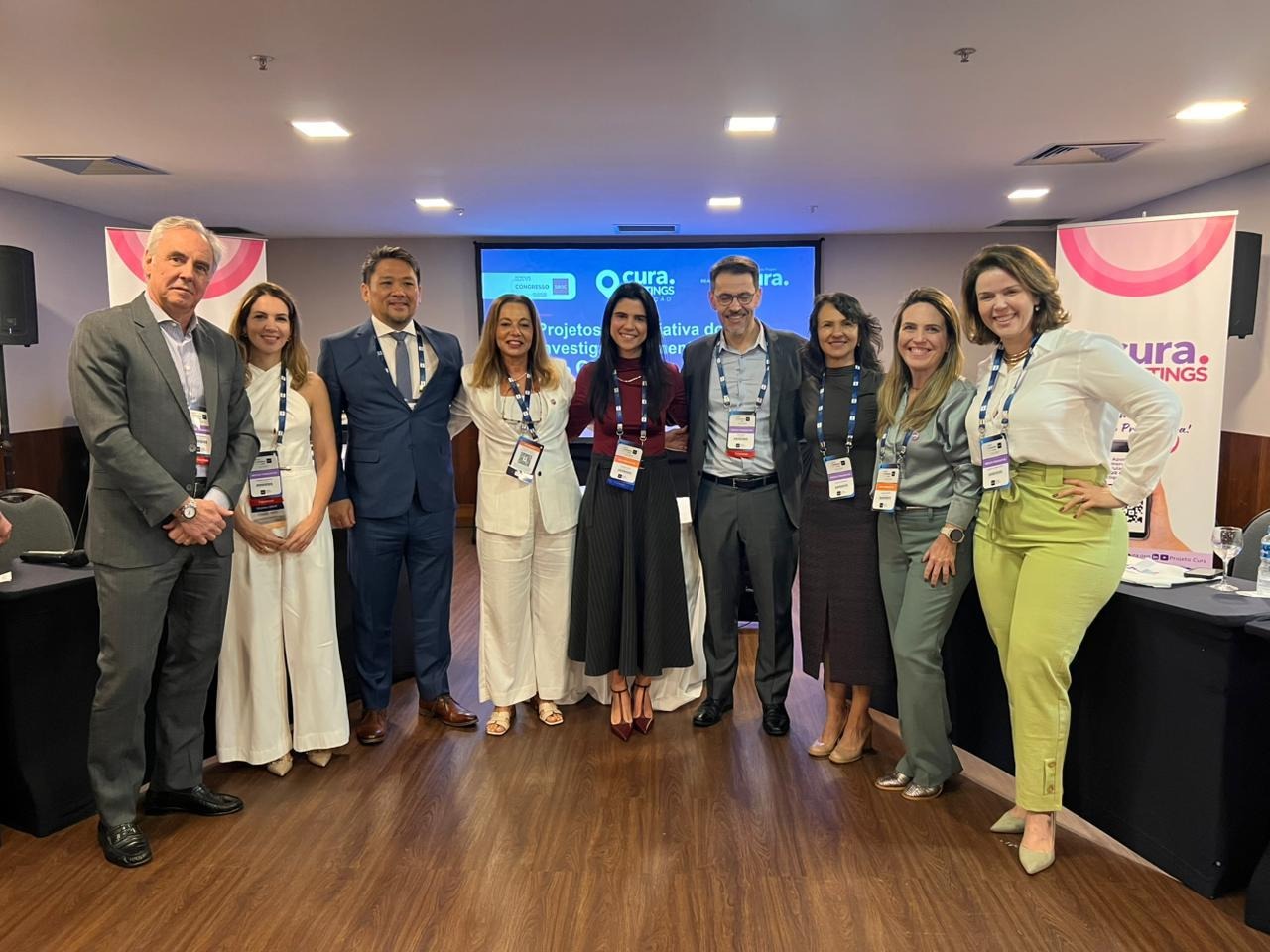
Dr. Felipe Roitberg also emphasized the need for coordinated action between the public and private spheres. For him,
“it is essential to strengthen local research and to couple national intelligence into forums organized by the government, avoiding isolated initiatives.”
Among the event's discussants, Dr. Heloisa Resende, president of the Cura Scientific Committee, highlighted the role of awareness as one of the pillars of the institution.
Complementing this vision, Luciana Pereira highlighted the importance of patient literacy and active participation.
The edition also included an international lecture by Dr. Christopher Booth, who brought to the debate the Common Sense Oncology (CSO) movement, aimed at building patient-centered cancer care. According to him,
“Access is a human right, decisions must be shared, treatments fair, and research must serve patients and society.”

Closing the meeting, Thiago Liguori presented the lecture
“How innovations in digital technologies can expand access, improve data quality and place the patient at the center of the process”, highlighting the change in the profile of those seeking care: “Today, the patient comes to the office with much more information - and the professional's role is to sit down with him, discuss that information and bring him to the center of the conversation, making him a true decision maker.”
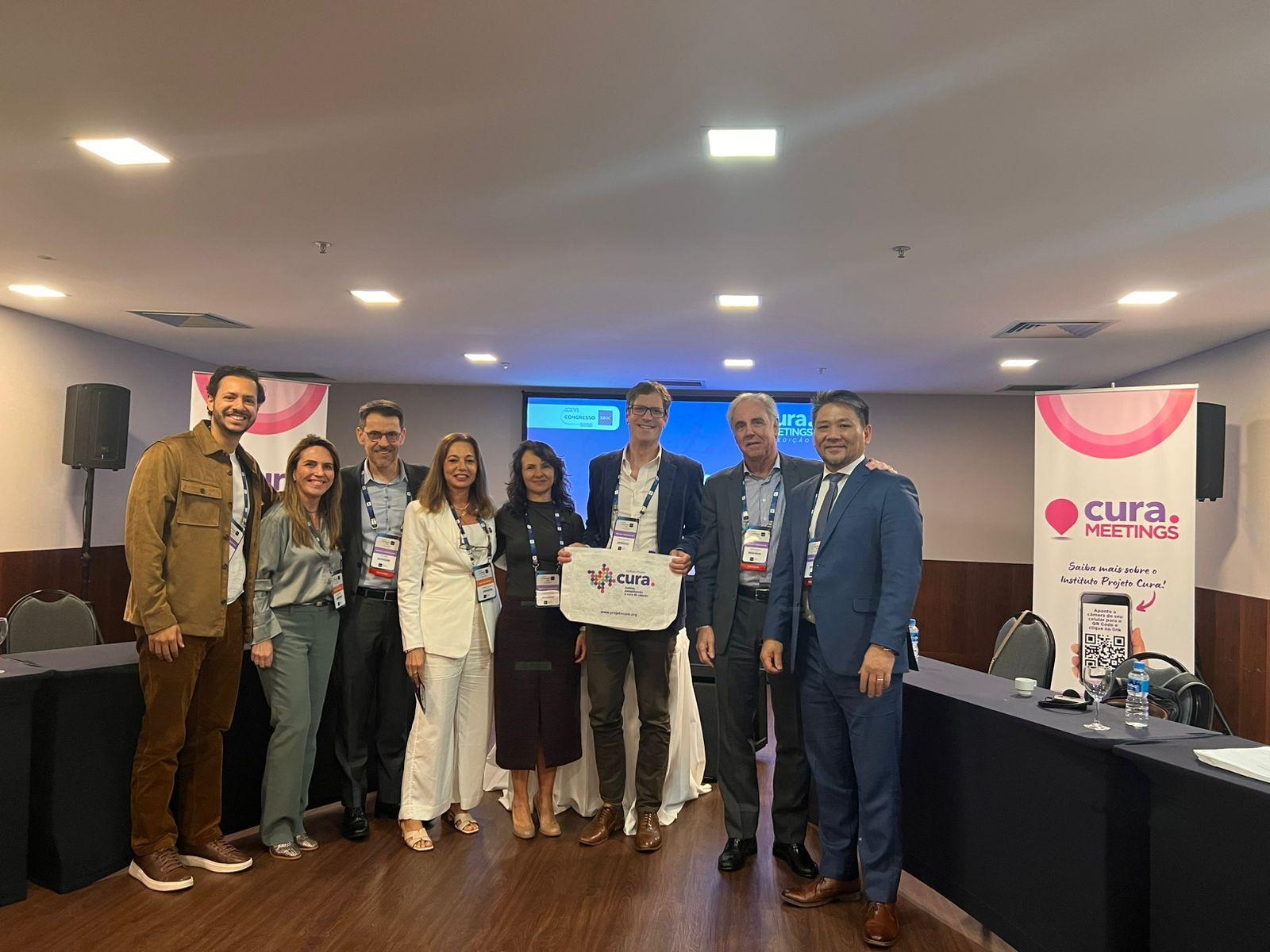
Participating in the audience, Dr. William William, member of the Scientific Committee of the CURA Project Institute and Director of the XXVI SBOC Congress, greeted the table, the debaters and the guests, offering a warm welcome and a note of support for the CURA Meetings event.
Next steps
Among the consequences of the 6th CURA Meetings are the internationalization of actions, bringing the CURA Institute closer to patient organizations in other regions of the world, and the expansion of access to clinical studies, focusing on the diversity of Brazilian patients and the transformation of local research ecosystems.
CURA continues to strengthen its role as a connector and supporter of strategic partnerships, reaffirming its commitment to more inclusive, collaborative, and sustainable clinical research.
The recording of the 6th Cura Meetings is available in two modules, on the YouTube Channel of the Cura Project Institute: https://www.youtube.com/@ProjetoCura

In a scenario in which clinical research plays a fundamental role in the advancement of oncology and access to innovative treatments, the Cura Project Institute reinforces its commitment to bringing science and society closer together through spaces for dialogue and learning.
The CURA Meetings were created precisely for this purpose, to promote meetings that bring together specialists, researchers, patients and leaders to discuss the paths of more humane, accessible and sustainable research, focusing on the outcomes that really matter to the patient.
The 6th edition of CURA Meetings will take place on November 7, 2025, from 8 a.m. to 12 p.m., during the XXVI Congress of the Brazilian Society of Clinical Oncology (SBOC), at the Windsor Oceanico Hotel, in Barra da Tijuca (RJ). The event, held at Sala Ibiza II, will bring together health professionals, researchers, industry representatives, journalists, and leaders from the public and private sectors.
With the theme “Sustainable Research: Outcomes that Matter to the Patient”, the meeting proposes reflections and debates on how to strengthen clinical research in Brazil in an ethical, efficient way and with a real impact on people's lives.
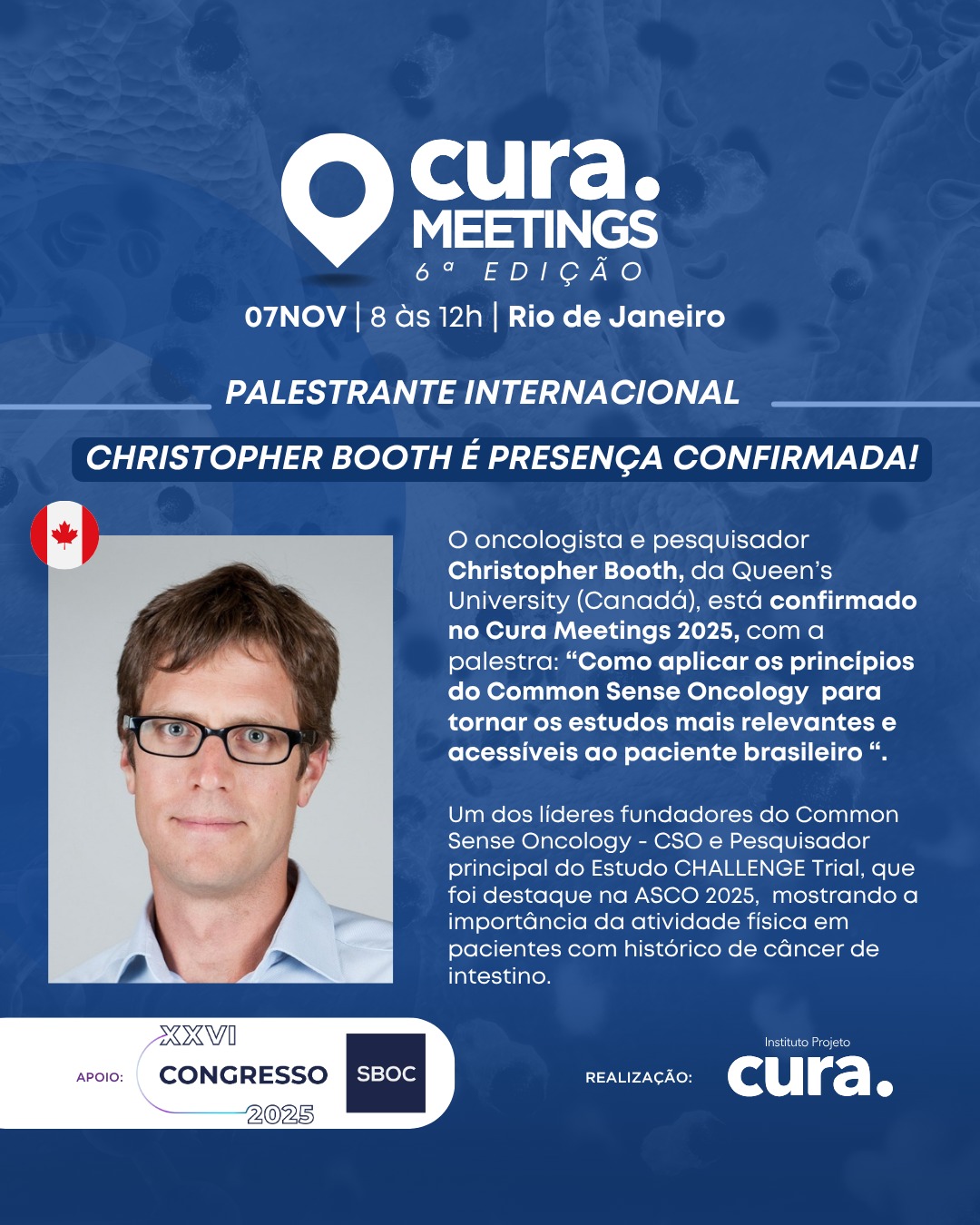
Schedule
The event will be divided into two modules that connect sustainability, innovation and the patient's role in the clinical research process.
1st Module | Sustainable Research: Outcomes that Matter to Patients
Time: 8:10 to 9:45
Moderation: Fernanda Schwyter
Debaters: Carlos Barrios, Max Mano and Roberto Arai
The first module will discuss the development of sustainable and relevant clinical studies, presenting perspectives from different actors in the area:
Where the study takes place: Center for Research and Sustainable Strategies — Vanessa Teich
Researcher-initiated studies: Challenges in seeking support in the face of innovations and new trends — Clarissa Balduto
Expanding the access of new drugs to researchers: How to combine local clinical research development with global strategies — Gabriela Prior
Debate: Building promotion bridges and support network — how to align and coordinate different actors to maximize impact and expand access to research to the population.
2nd Module | Brazilian Patient Empowerment and the Common Sense Oncology (CSO) Perspective
Time: 10:15 to 12:00
Moderation: Heloisa Resende
Debaters: Felipe Rotinberg, Roberto Arai, Luciana Pereira, Max Mano and Carlos Barrios
The second module provides an in-depth discussion about patient empowerment and their active participation in clinical research, highlighting the role of technological innovations and international collaboration.
Among the highlights is the participation of Dr. Christopher M. Booth, oncologist and researcher at Queen's University (Canada), founder of the Common Sense Oncology (CSO) movement, who will give the lecture “How to apply the principles of the CSO to make studies more relevant and accessible to Brazilian patients”.
According to Dr. Booth:
“We will work for equitable access to high-quality, affordable care. Improvements in the generation, interpretation, and communication of evidence will help close those gaps and bring our area closer to a future where a patient's outcome isn't determined by where they live, what they can afford, or the strength of a marketing campaign.”
The module will also cover:
How innovations in digital technologies can expand access, improve data quality and place the patient at the center of the process — Thiago Liguori
The role of civil society organizations and patient networks: How to innovate to strengthen participant-centered research — Fernanda Schwyter
Final debate: How to make the patient an active partner in all phases of clinical research - from the design of the study to the dissemination of the results - through digital tools, health education and sustainable engagement models.
Commitment to more humane and accessible research
CURA Meetings reaffirms the commitment of the Cura Project Institute to promote integration between science and society, strengthening a culture of clinical research that places the patient at the center of decisions and results that really matter.
The initiative continues to expand the dialogue on equity, sustainability, and social impact in clinical research, with the objective of transforming scientific knowledge into a direct benefit for the population.
Service
Date: November 7, 2025
Time: 8:00 to 12:00 (interval from 9:45 to 10:15)
Location: Windsor Oceanico Hotel — R. Martinho de Mesquita, 129, Barra da Tijuca, Rio de Janeiro (RJ)
Room: Ibiza II
Registrations: Registrations for the 6th CURA Meetings are linked to the XXVI SBOC Congress and must be made at: https://www.congressosboc.com.br
All interested parties can register and participate in both the CURA Meeting and the Congress program.

The month of #OutubroRosa gains another ally! Trastuzumab Entansine (T-DM1), an innovative drug, has been incorporated into the Unified Health System #SUS for the treatment of HER2-positive breast cancer, one of the most aggressive forms of the disease.
The Ministry of Health's investment of R$ 159 million will make it possible to meet 100% of the national demand, benefiting more than a thousand women in 2025 alone. In addition to representing a therapeutic advance, the announcement reinforces the importance of the integration between clinical research, technological incorporation and public policies for pharmaceutical care.
For the Cura Project Institute, whose mission is to expand access to information and strengthen oncology research in Brazil, this is a concrete example of how science reaches society. Trastuzumab Entansine has undergone years of clinical studies that have proven its efficacy in significantly reducing the risk of recurrence and mortality in patients with HER2-positive breast cancer.
Scientific Achievement
The international KATHERINE study proved that T-DM1 reduces the risk of recurrence and death by about 50% among patients with residual disease — those who still had a tumor after initial treatment with chemotherapy and target therapy.
“Patients are fundamental to the progress of science through the development of new treatments. The informed decision to participate in clinical studies like this enables advances that benefit both those who participate and future generations of patients.”
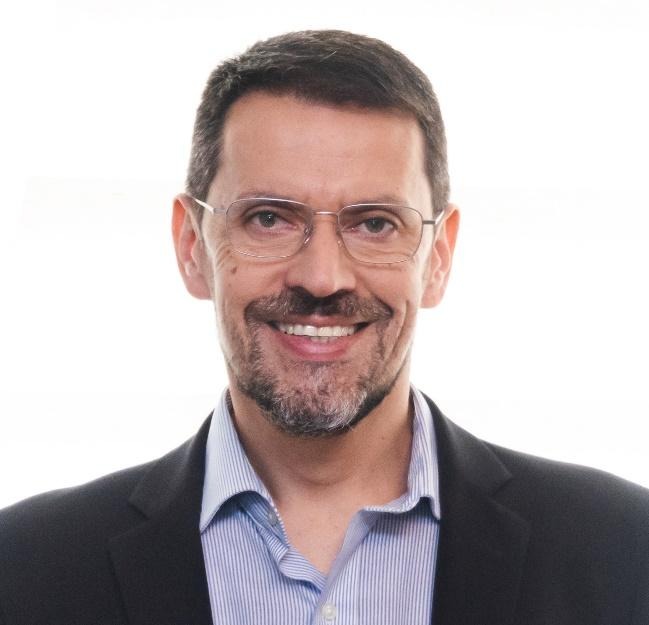
The arrival of this therapy to the SUS is a scientific achievement and also a framework of equity in public health, which expands access to innovative treatments and improves the survival prospects and quality of life of patients treated in the public network.
Brazilian Participation
Brazil contributed centers of excellence that conducted the study: INCA (RJ), ICESP (SP), Barretos Cancer Hospital (SP), Moinhos de Vento Hospital (RS), Integrated Oncology Clinics/Instituto Américas (RJ), Paraná Oncology Institute (IOP) (PR), Oncology Clinical Research Unit (RS), Hospital Nossa Senhora da Conceição (RS), Institute of Teaching and Research (IEP-SP) and Hospital Pérola Byington (SP).
“The commitment of Brazilian participation in the study demonstrates our commitment to the advancement of clinical research and its impact on public health. This result reinforces how essential it is to expand our presence in more and more studies, on different fronts, and also creating our own opportunities and windows of accessibility through Brazilian studies.”
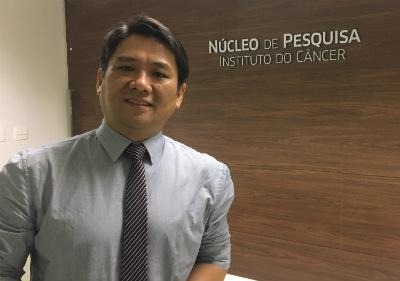
This movement talks with the strengthening of national pharmaceutical care and oncology policies in the SUS, which need to be continuously improved. Ensuring the rapid incorporation of drugs based on scientific evidence and the effective functioning of radiotherapy and chemotherapy services are essential steps so that access to innovation does not depend on the CEP, but on the clinical needs of each patient.
In addition to the new drug, the Ministry of Health is also making progress in complementary measures, such as expanding the age range for mammograms over 40 and the deployment of mobile carts specialized in prevention and early diagnosis. The combination of these actions strengthens the cancer care network, from screening to treatment.
Each such advance reinforces the central role of clinical research in the transformation of public health policies. It is through it that discoveries are translated into access, and that science is converted into hope.
Note: the cover image was generated by artificial intelligence and does not represent actual photographic material of the product. For illustrative purposes only.

When we think of clinical research, we often remember new medications. But science goes far beyond that and the Cura Project Institute is here precisely to expand this understanding, sharing information about the importance of clinical research and how it transforms people's lives.
Research is not restricted to drug tests: it can also investigate changes in habits, such as the practice of physical activity, diet, and well-being. And the results show that this care has an enormous impact on the quality of life and even the survival of people with cancer.
A recent example comes from the Challenge Trial, a Canadian study led by Dr. Christopher M. Booth, from Queen's University, which proved that supervised exercise can reduce the risk of colon cancer returning and increase the chance of living longer.
In other words: not only do medications save lives - movement, information, and lifestyle change are also part of the treatment.
How was the study done
This follow-up helped patients plan goals, organize time, and gradually increase the frequency of exercises - such as walking, cycling, running, and swimming - while maintaining the practice over time.
What the study showed
The patients who participated in the structured exercise program:
In practical numbers:
Side effects:
There were no serious problems - just a slight increase in the risk of muscle injury, something common in those starting an exercise routine.
Conclusion
The study showed, in an unprecedented way, that supervised physical exercise should be part of the standard treatment for patients with colon cancer. For this benefit to reach everyone, it is essential that hospitals, professionals, and health systems offer structured physical activity programs as part of cancer care.
The Cura Project Institute reinforces the importance of disseminating this type of scientific evidence. After all, clinical research is also about quality of life — about understanding how different approaches, medication or behavioral, can help cancer patients live better and longer.
Check out the full study: Challenge Trial — Journal of Clinical Oncology

The history of the Cura Project Institute begins with an encounter. In 2009, Fernanda Schwyter was living in Miami when she faced a surgical complication. These were months of hospitalizations, physical limitations and communication difficulties that awakened empathy for patients and the desire to change many life stories.
After her recovery, she met Ilma, a young Brazilian woman recently diagnosed with metastatic breast cancer. Closely following Ilma's treatment, Fernanda discovered a universe still little known in Brazil: that of clinical research. In Miami, clinical trials were affordable and offered innovative treatments and hope to patients, but why did so many people need to cross borders to access these opportunities?
Check out the Veja Saúde article in full. Click here!
Determined to understand and understand this universe, Fernanda began to volunteer at the American Cancer Society, where she met people with relevant international experience, such as Dr. Javier Cortez (Spain), Stefano Zurrida (Italy), Henry Gomez (Peru), Orlando Silva (USA) and Jorge Zavala (Mexico).
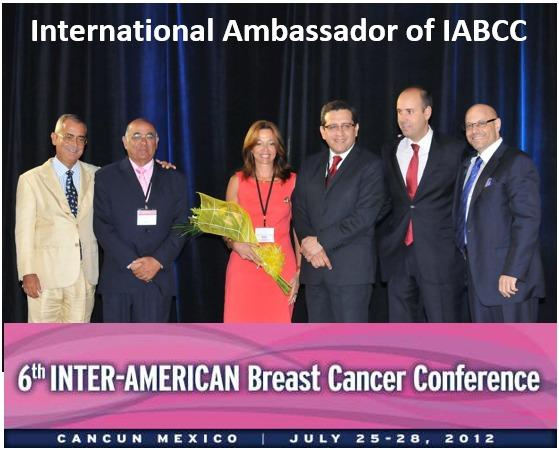
In 2012, she was invited to coordinate the 6th Inter American Breast Cancer Conference conference, in Mexico, to discuss the challenges of clinical research in Latin America. It was in this environment that she met Dr. Martine J. Piccart, one of the greatest references in oncology and clinical research, as well as other international specialists who encouraged her to bring her vision of access to clinical research to Brazil.
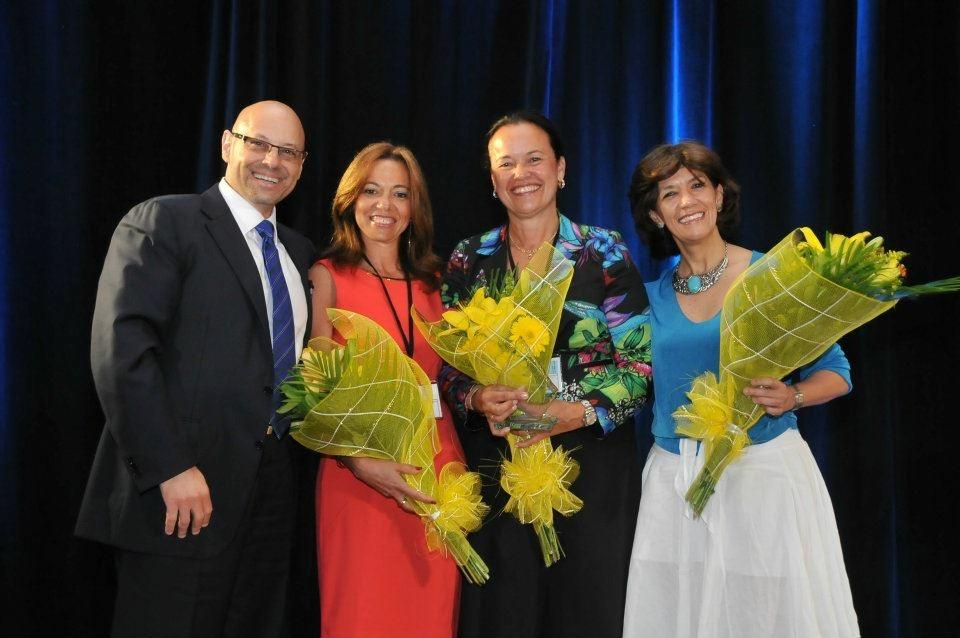
Among the doctors who marked this trajectory, the Brazilian oncologist Carlos Barrios, founder of LACOG (Latin American Cooperative Oncology Group), also stands out. From this connection in 2015, priorities emerged to leverage studies that respond to oncological emergencies and local medical issues.
The CURA Project, which in 2019 became the CURA Project Institute — a non-profit organization dedicated to supporting and engaging patients through quality scientific information, support for Brazilian clinical studies, and innovative clinical trials. Since its creation, the Institute has supported 12 clinical and epidemiological studies, directly and indirectly benefiting more than 2,000 patients, combining the training of new researchers through the recognition of initiatives that have a real impact on patients' lives.
“During my work as a volunteer at the American Cancer Society in 2012, I had the opportunity to meet international doctors at the congress in Mexico who today have global repercussions. It was these brilliant minds that showed me, in a very clear way, the importance of clinical research and inspired me to bring this movement to Latin America, planting the seed that would give rise to the CURA Project Institute.” Fernanda Schwyter
Today, Fernanda heads the CURA Project Institute with a mission to bring patients, medical researchers and science closer together to open paths towards curing cancer.
Just like Ilma, who 15 years after her diagnosis, is undergoing treatment in a clinical trial and closely monitors the growth of her children, thousands of patients can benefit when research becomes part of the care. The CURA Project Institute is an invitation for people to go on the road together to make a difference.
We interviewed our President, Fernanda Scwyter, who, with this inspiring vision, shares with us some of her history, the emergence of the Cura Project Institute, the challenges still faced and the dreams that continue to drive Cura:
What was the moment when you realized that your personal health experience could be transformed into a project capable of impacting so many patients?
Fernanda: First it happened, then I realized it. In other words, I never intended to found an Institute or anything related to research and cancer. But things just happen. My experience first impacted myself. I had to face the possibility of death, organize my family, and reflect on life. By surviving, I felt like I needed to give back, doing something meaningful that could impact others.
How did contact with Ilma and international doctors, such as Dr. Martine Piccart, influence the creation of the CURA Project Institute?
Fernanda: With Ilma I experienced spirituality, feminine strength, and connection with life and with Our Lady. With Ilma came the “CURE KIT”. With international doctors, I realized the responsibility and legacy of science, the effort to decipher the human body to save lives. It was in this encounter between faith and science that the CURA Project emerged.
Tell us about the “CURE KIT”.
Fernanda: The name of the Institute has a very significant history for me. When I met Ilma, I prepared a small gift for her with things that had helped me on my own journey: a rosary, a floral oil, and songs that comforted me. Upon receiving it, she called that gesture a “healing kit”. Years later, when telling this story to a publicist who encouraged me to name the project, he told me that there was no stronger and truer name than that: Cura. This is how the Healing Project was born, carrying within itself the importance of caring for others and the belief that, even in the face of pain, it is possible to find paths of life, comfort and transformation.
What were the biggest barriers to bringing clinical research culture to Brazil and engaging patients and institutions?
Fernanda: We still face barriers, especially greed and the difficulty of understanding the true meaning of philanthropy, a collective path to be built.
Among the studies and actions already carried out by the Institute, which result most thrills you or symbolizes the transformation you were seeking?
Fernanda: It's the patients' stories that move me the most. Iramara, who, even leaving chemotherapy, wanted to attend our events to share her experience with clinical research, and Juliana, who, through genetic testing, was able to transform the lives of her entire family with prevention. In addition, seeing the results of studies such as NEOSAMBA reinforces the power of science and symbolizes the transformation we seek with the Institute.
What are CURA's next steps and your biggest dream for clinical research and access to new treatments in the country?
Fernanda: Do research that impacts our population. My biggest dream? The cure for cancer!

On September 17, the CURA Project Institute promoted the panel “From Care to Partnership: Connecting Patients and Researchers” during the 12th All Together Against Cancer Congress (TJCC). The meeting was a space for dialogue and reflection on the present and future of clinical research in Brazil, bringing together patients, doctors and researchers in an essential conversation to broaden society's understanding of the topic.
Throughout the panel, different voices brought complementary perspectives:
* The Patient's Voice — Dr. Renata Rodrigues da Cunha Colombo Bonadio, who experienced cancer as a patient, and Izabel Masetti shared experiences that reinforce the importance of listening to those living with the disease and research in practice.
* What patients tell us — Oncologist and researcher Dr. Heloisa Resende presented unprecedented results from the national survey of cancer patients conducted by CURA. The study revealed that 90% of respondents believe that clinical research is beneficial to society, but half still perceive more risks than benefits. The data highlights the continuous need for education and training of the population on the subject.
* Research without frontiers — Oncologist Dr. Max Mano brought a global perspective, showing that the advancement of clinical research goes beyond economic factors, also involving regulatory and structural issues that can transform the scenario even in developing countries.
* Connecting patients and clinical studies — The president of CURA, Fernanda Schwyter, reinforced the Institute's mission to raise awareness, empower, generate data, promote public policies and create real tools for accessing information, such as the Patient Committee and the new platform launched during the event.
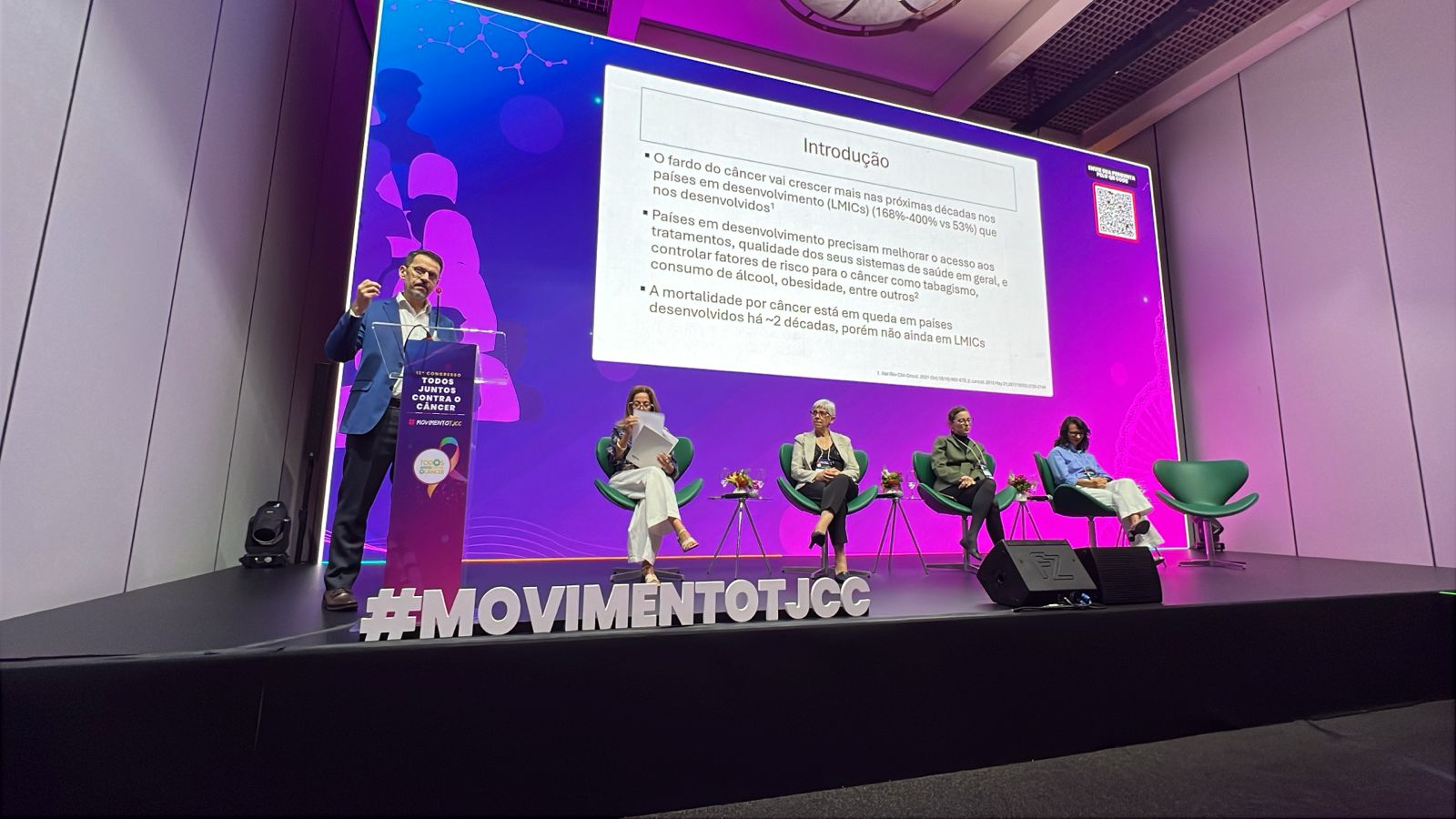
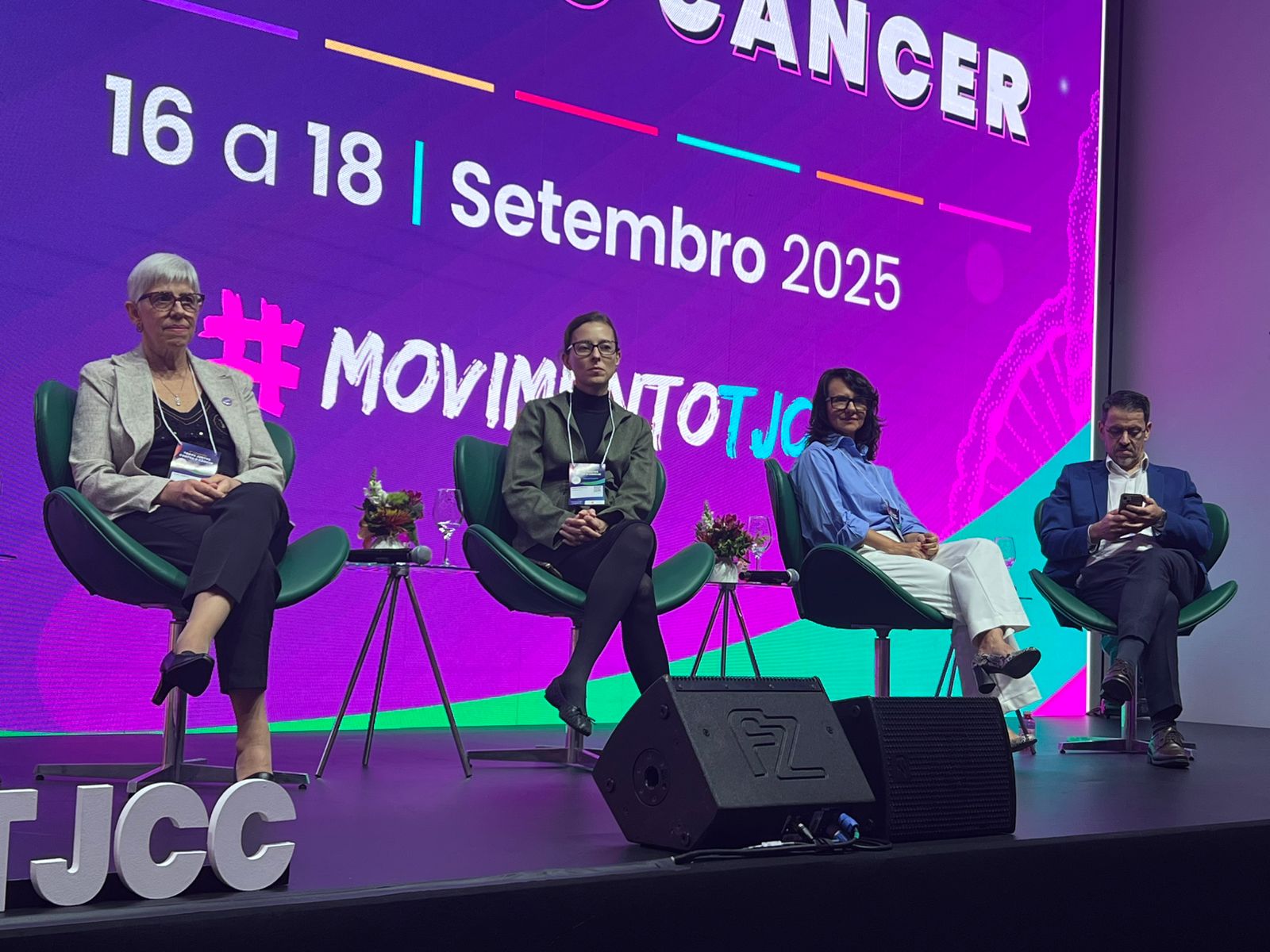
.jpeg)
CURA platform: information and access in one place
During the panel, the CURA Platform was launched, a free, intuitive and easy-to-navigate tool that gathers reliable information about ongoing clinical research in Brazil. The initiative, supported by LACOG and curated by Dr. Taiane Rebelatto, is enough to break down barriers, expand access and create new opportunities for patients and doctors.
.jpeg)
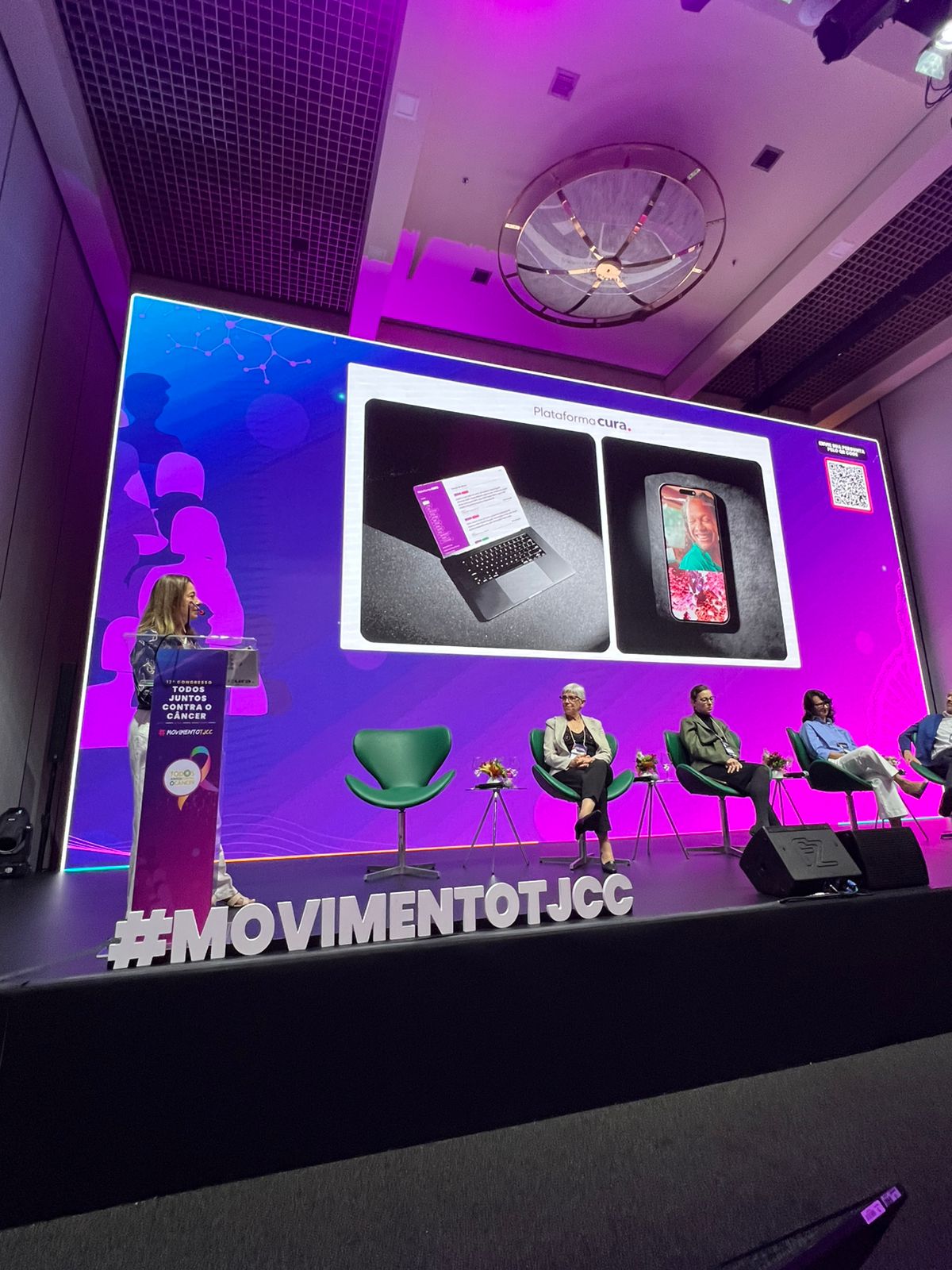
Access, share, and publicize: Www.platformacura.org
The platform is currently undergoing tests and adaptations, and will soon have 100% of its navigation available, offering a complete experience to users.
With this concrete step, the CURA Project Institute reaffirms its commitment to building bridges between patients and researchers, breaking myths, giving voice to those living the cancer journey and making clinical research more understood and accessible to all.

On September 17, 2025, the Cura Project Institute, a non-profit organization dedicated to strengthening clinical research in oncology, promotes the CURA Panel during the 12th All Together Against Cancer Congress (TJCC). The meeting will take place from 14:50 to 16:30, in Ballroom 3, at the WTC Events Center, in São Paulo/SP.
With the theme “From care to partnership, connecting patients and researchers”, this will be a space dedicated to dialogue between patients and the scientific community, bringing reflections and unprecedented results of a national survey conducted by the Cura Project Institute, offering a broad view of their challenges, expectations and experiences.
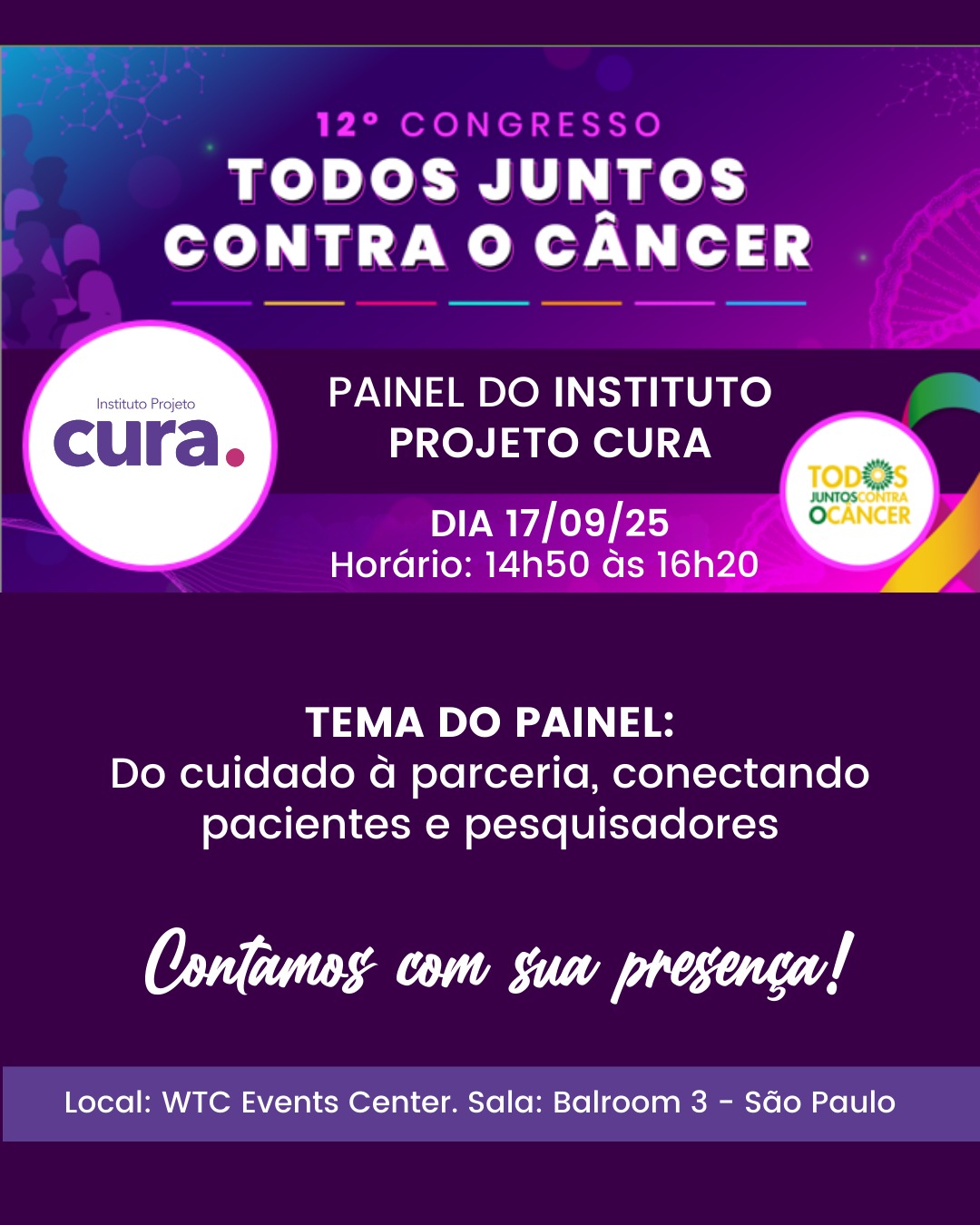
The session will be moderated by Fernanda Schwyter, founder and president of the Cura Project Institute, and will include the participation of leading specialists: Dr. Heloisa Resende, which will present data from the research conducted by the Cura Project Institute with patients regarding the participation in clinical oncology studies and Dr. Max Mano, which will present global clinical research data and the challenges for Brazil. They also participate in panel a Dr. Renata Rodrigues da Cunha Colombo Bonadio And the Architect Isabel Masetti, with testimonials and experiences as cancer patients.
The Panel is a unique opportunity to reflect on how to transform the relationship between science and society into a true partnership, placing the patient as a protagonist in the construction of knowledge and in the advancement of clinical research.
Schedule - 14:50 to 16:30
— Opening
Introduction to the panel theme
Fernanda Schwyter — Psychologist, founder and president of the Cura Project Institute
- Patient's Voice
Isabel Masetti — Clinical research participant in the treatment of myeloma and Dr. Renata Rodrigues da Cunha Colombo Bonadio — former cancer patient and medical oncologist working in D'Or Oncology in breast and gynecological tumors
— What Patients Tell Us
Dr. Heloisa Resende — Oncologist and researcher at the Jardim Amália Research Center. Coordinator of the High Complexity Oncology Unit (UNACOM) of HINJA — Volta Redonda/RJ and President of the Scientific Committee of the Cura Project Institute
- Research without borders
Dr. Max Mano — Oncologist at Albert Einstein Hospital. Co-director of Breast at LACOG and member of the Scientific Committee of the Cura Project Institute
— Encouraging and connecting patients with clinical studies: Presentation of the Institute and the CURA Platform
Fernanda Schwyter — Psychologist, founder and president of the Cura Project Institute
— Debate
-02.jpeg)
Kick-off of the Patient Committee and Launch of the CURA Platform — A milestone in access to Clinical Research in Brazil
During the panel of the Cura Project Institute, the President of the Cura Project Institute will present the institution's main actions in response to the needs revealed by the studies. His speech will focus on the concept “Our Patients, Our Partners”, highlighting two important initiatives.
The Congress will present the Patient Committee, a group composed of patients and specialists created to evaluate and propose improvements in research and accessibility and awareness actions, ensuring that the patient's perspective is present in all initiatives.
And the public will have first-hand access to the CURA Platform, developed by the Cura Project Institute in partnership with LACOG - Latin American Cooperative Oncology Group, the first multinational cooperative group in Latin America focused on clinical and epidemiological research in oncology.
The CURA Platform is a digital tool that provides information about open studies and where they are being conducted, in an accessible and intuitive format, connecting doctors, researchers and patients.
The official launch for patients will take place during the panel, reinforcing the mission of the Cura Project Institute to connect, inform, and engage society in the fight against cancer through science.
The TJCC Congress is open for registration!
Purchase your ticket to participate in person. Registrations to follow online are free. Access the link and sign up:
https://congresso.tjcc.com.br/
Arrive early to complete the check-in process! The panel will start promptly.

In the day August 29, 2025, it happened Cura Talks Gramado whose central theme was Integrative Care for Breast Cancer, carried out at Lupicinio Rodrigues Theater — Wish Serrano Resort, in Gramdo/RS. With an audience of 177 enrolled, 41% of whom were multidisciplinary and 24% comprised of patients, the meeting brought together specialists from different areas of health to discuss everything from prevention and early diagnosis to treatment and post-treatment challenges, with special attention to the reality of young women with breast cancer.
.jpg)
Debate highlights
The opening was conducted by Luciana Pereira, Project Coordinator of the Cura Project Institute, who moderated the module on breast cancer subtypes and their impact on treatment, with the participation of the oncologist Dr. Gustavo Werutsky And lectures from Dr. Max Mano, who explained the role of molecular profiling in therapeutic personalization, and of Dr. Heloisa Resende, which addressed strategies to reduce the time between diagnosis and treatment initiation. Already the Dr. Patrícia Prolla highlighted the importance of genetic tests for selected patients, an increasingly relevant topic in clinical practice.
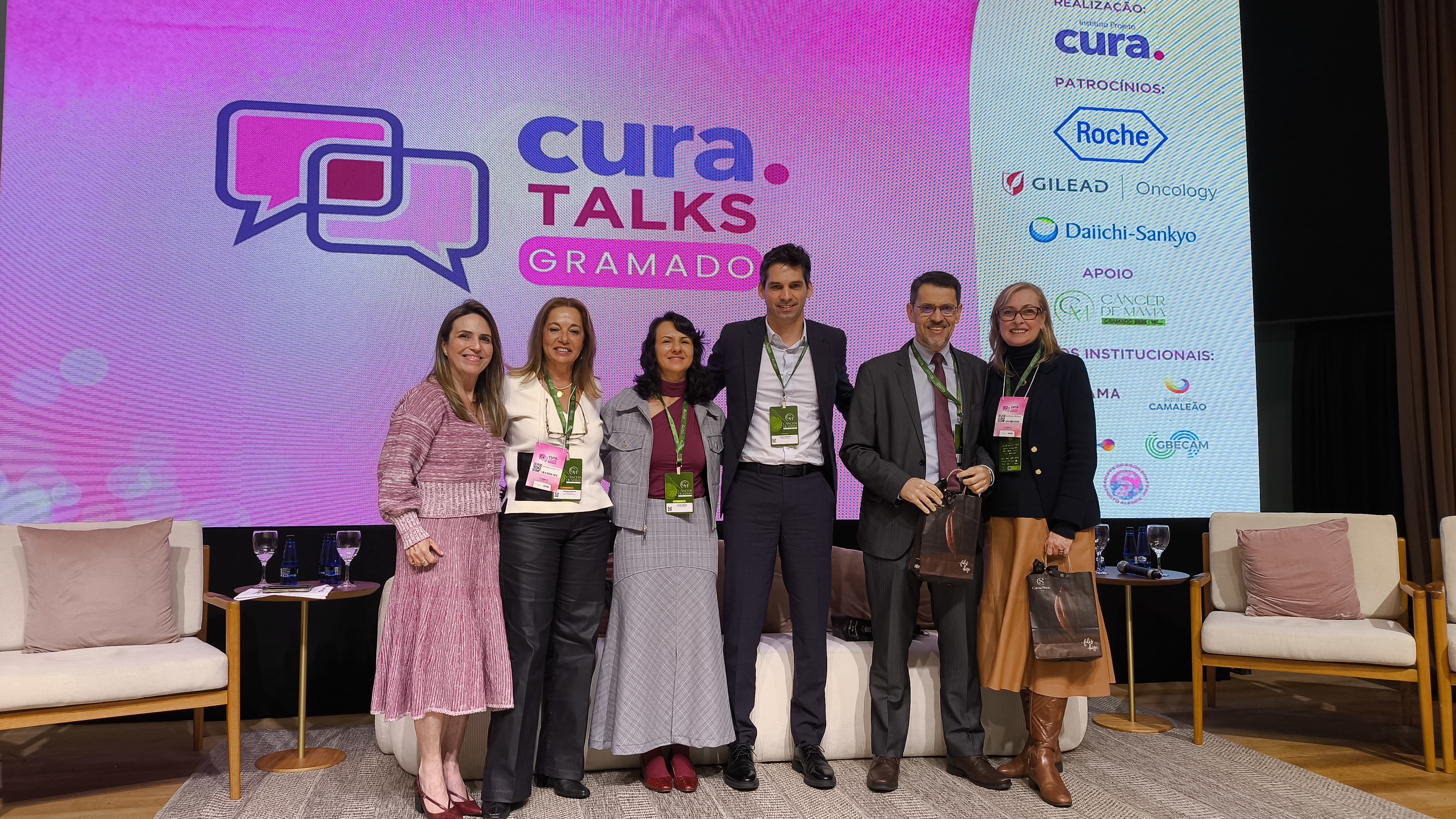
In the second module, experts discussed the increase in incidence of breast cancer in young women. A Dr. Angélica Nogueira provided data on the systemic approach in these cases, while Dr. Mónica Rodríguez presented the advances of oncoplastic surgery. The debate was moderated by Fernanda Schwyter and also included contributions from Dr. Sergio Azevedo And from Dr. Heloisa Resende, reinforcing the importance of an integral and multidisciplinary perspective.

In the afternoon, the focus was on multidisciplinary approach, moderated by the nurse Ariane Pereira Osório. Highlights included the nutritionist's lecture Dr. Fernanda Bortolon, who emphasized the importance of adequate nutrition to adhere to treatment and combat fake news; from the dentist Dr. Bianca Abreu de Azevedo, who recalled the need for oncological dentistry before and during therapy; of the physiotherapist Alessandra Tessaro, who spoke about functional rehabilitation after breast surgery; and about the oncologist Dr. Jesse Lopes, who addressed the benefits of exercise during treatment. The pharmacist Virginia Webber presented cases of patients in clinical research, highlighting how these studies increase survival and quality of life. The oncologist also participated Dr. Tomas Reinert, who spoke about the work of the Brazilian Breast Cancer Studies Group of which he is director. In addition to Dr. Roberto J. Arai who is Chief Operating Officer of the Cura Project Institute, responsible for operational management focusing on innovation, clinical research and social impact.
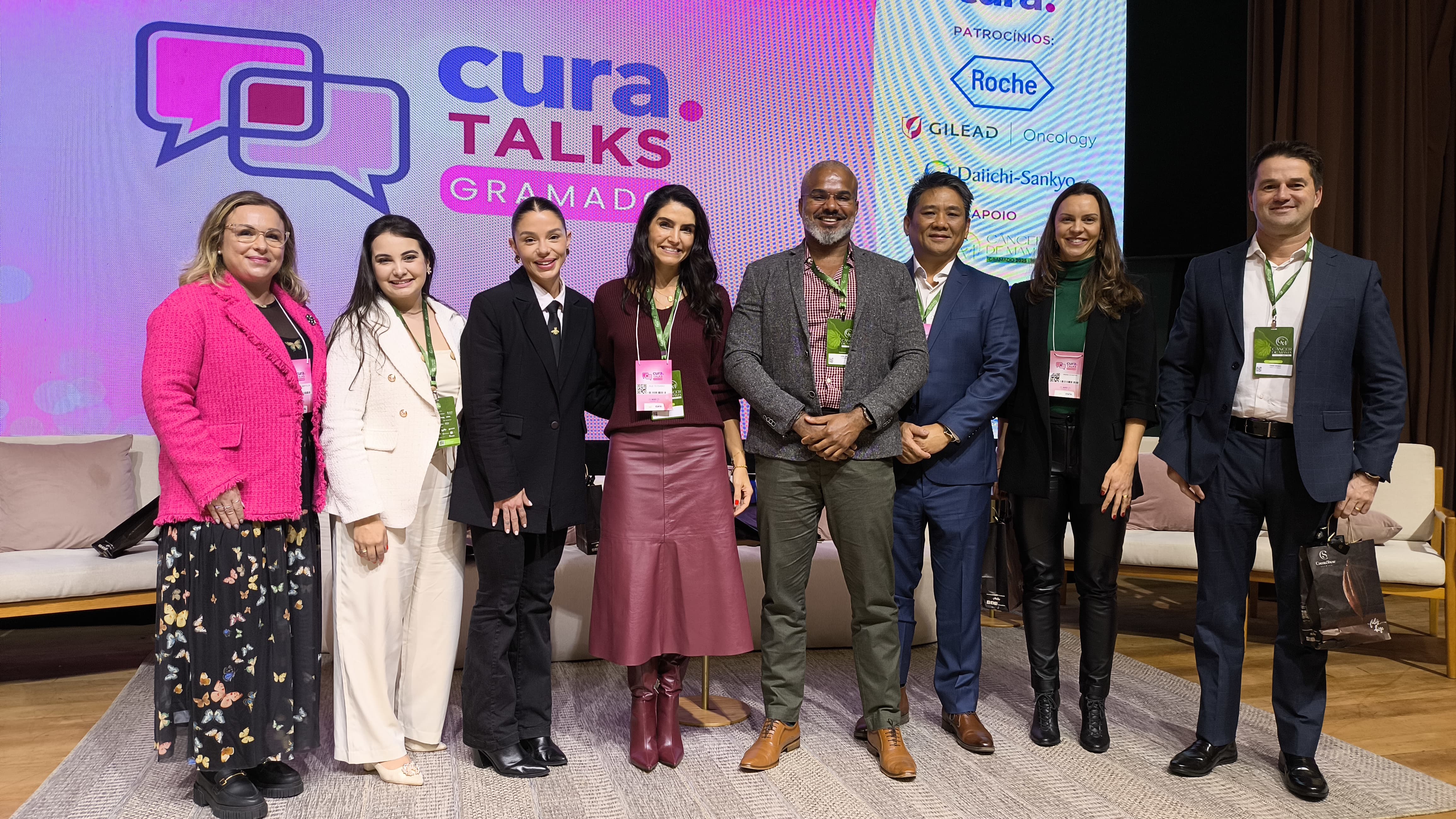
Another highlight was the panel with the Dr. Laura Testa, Dr. Maira Caleffi and Alexandre Bem, Moderated by the Cura Counselor, Catia Duarte, who reflected on public policies and the challenges of accessing innovative treatments in Brazil, with the theme of PCDT for Breast Cancer.

The closing brought about a welcoming debate about life after treatment, moderated by Fernanda Schwyter, with the oncologist Dr. Luciana Landeiro, who presented guidelines for post-treatment follow-up, Dr. Aline Coelho Gonçalves, who shared the most recent studies of ASCO 2025 about patients' quality of life and well-being and the oncologist Dr. Alessandra Morelle. The discussion was widely attended by the public, especially around the topic of sexual health and loss of libido after treatment.

A meeting of integration and impact
O Cura Talks Gramado emphasized the importance of integrated care and the role played by patients in the construction of their treatment journeys. O Dr. Carlos Barrios, at the closing, emphasized the commitment to maintain the support of the Gramado Breast Cancer Congress for the Cure Project, strengthening research and innovation in oncology.

.jpg)
The event was supported by institutional support from Femama, Camaleão Institute, Awa'Pé Dragon Boat Team, GBECAM and LACOG, in addition to Support from the Gramado Breast Cancer Congress. The master sponsorship was from Roche, with the sponsorship of Daiichi Sankyo And from Gilead, institutions that reinforce their commitment to the science and advancement of oncology in Brazil.
The full recording will be available on the digital platforms of Cura Project Institute, expanding the access of professionals, patients, and researchers to the discussions that marked this edition.
Follow the Cura Project Institute on social media: @projetocura
Until the next edition of Cura Talks!

Free event On August 29, experts will be brought together to discuss the impact of integrating different areas in the patient's journey
Gramado, RS — Breast cancer is the most common type among women in Brazil and in the world. According to the National Cancer Institute (INCA), 73,000 new cases are estimated annually in the country in the triennial period 2023-2025, corresponding to almost 30% of all female tumors. Despite advances in diagnosis and treatment, experts emphasize that the greatest current challenge is to ensure comprehensive care, which considers not only the disease, but the patient in all its physical, emotional and social complexity.
This will be the focus of Cura Talks Gramado 2025, promoted by the Cura Project Institute, which takes place on August 29, from 8:30 to 18:00 at the Teatro Lupicinio Rodrigues — Hotel Wish Serrano, in Gramado (RS). O free event will bring together health professionals, patients, and families to discuss how the multidisciplinary approach directly impacts clinical outcomes and women's quality of life.
Nutrition as a key element in integrated care
Nutritionist Fernanda Bortolon points out that diet is a fundamental part of this process: “Nutrition is essential in the multidisciplinary care of women with breast cancer: it helps to manage side effects, to maintain adequate weight, to preserve muscle mass and to improve quality of life. Studies show that personalized nutritional interventions are associated with a lower risk of recurrence, better treatment tolerance and longer survival, reinforcing the fundamental role of the oncology nutritionist in the team.”
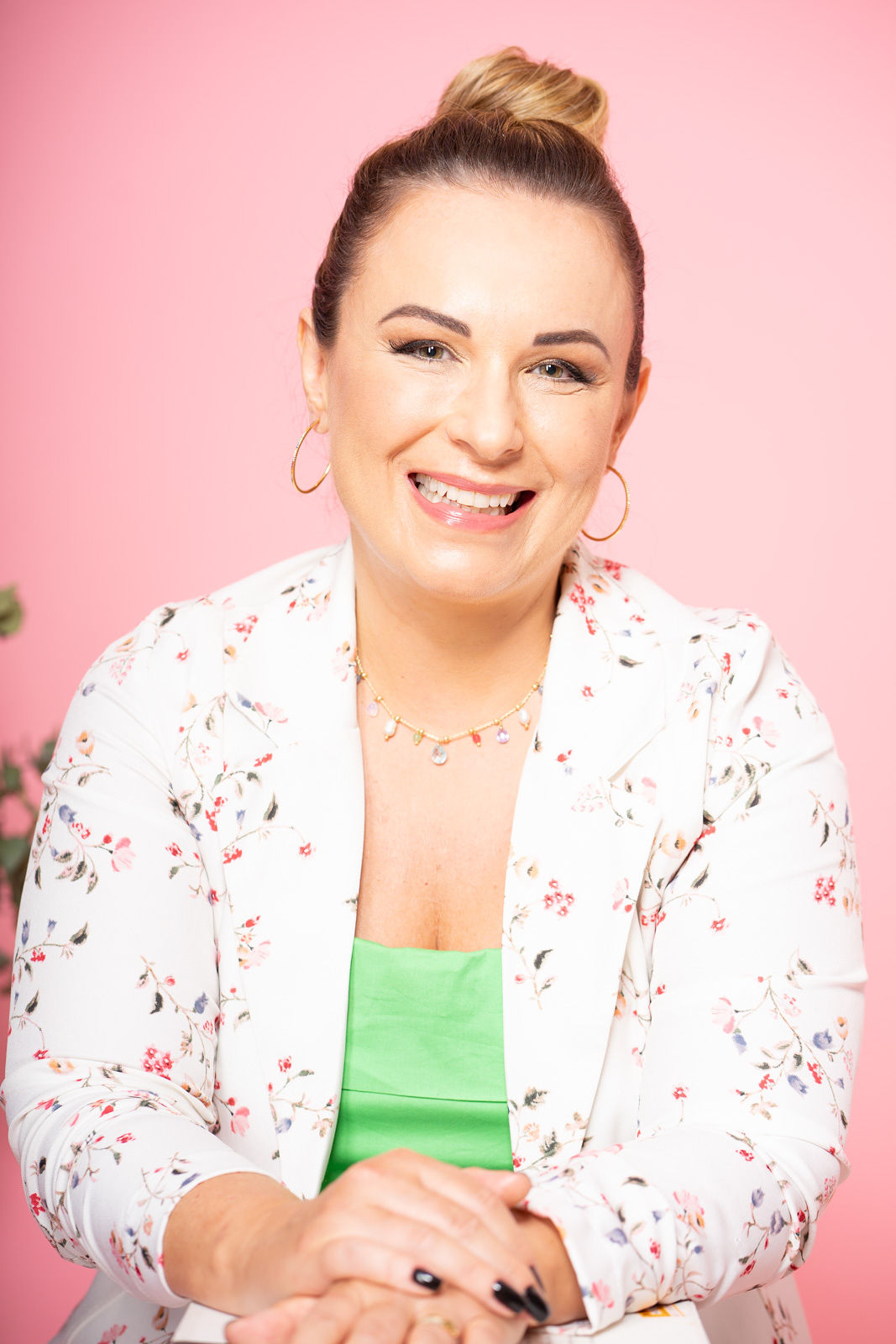
The view of the clinical oncologist
The oncologist Dr. Tomás Reinert, who participates in the panel on the importance of the multidisciplinary team, reinforces the impact of this care model: “Breast cancer must be treated not only with medications and procedures, but also with comprehensive care. The presence of a multidisciplinary team makes a real difference in the patient's journey, helping to reduce side effects, preserve mental and physical health, and promote healthier lifestyle habits. Studies show that this approach is associated with greater adherence to treatment, better quality of life, and even increased survival, reinforcing the importance of integrating different professionals in cancer care.”
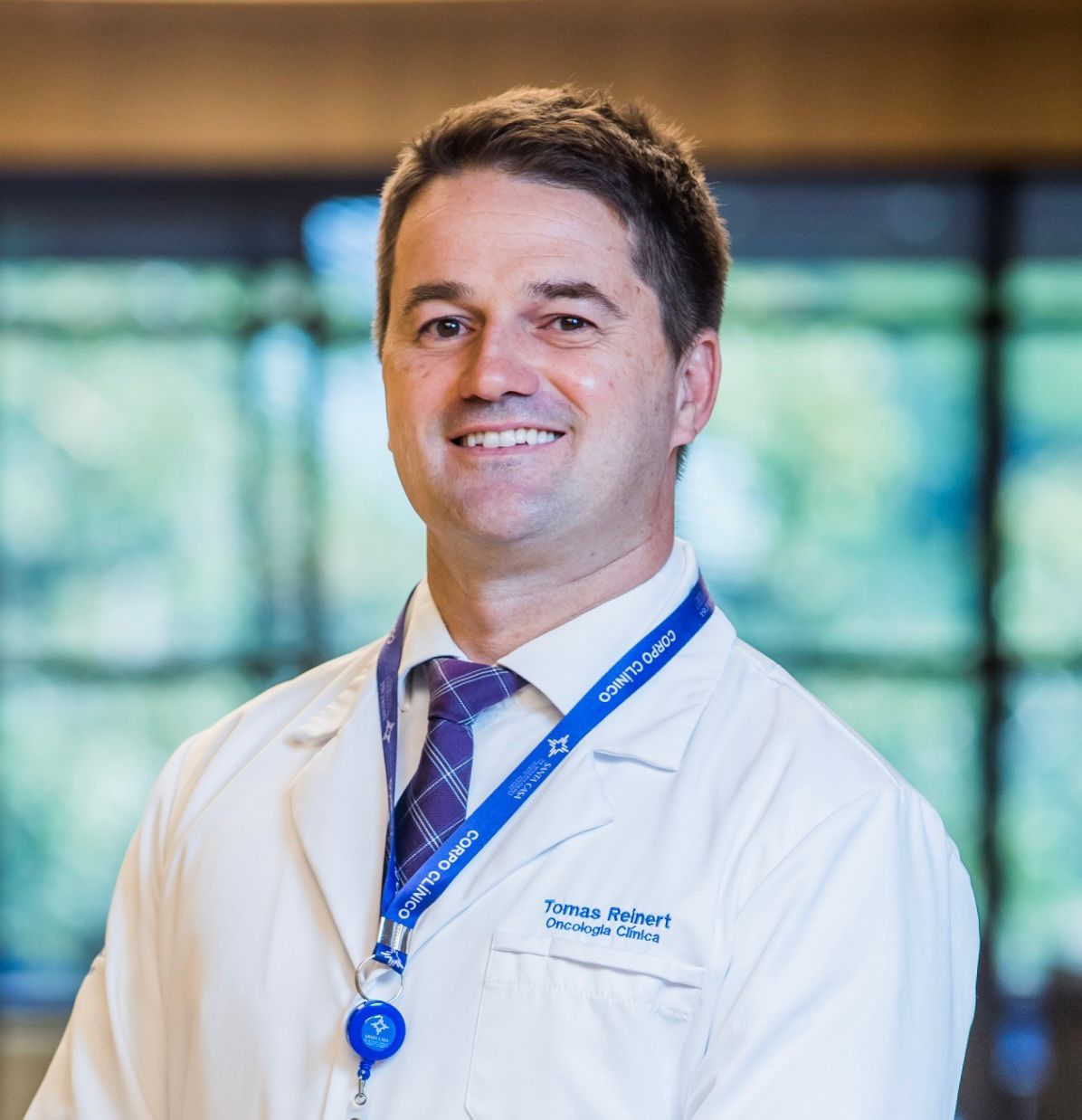
With the theme “Integrated Care for Breast Cancer”, Cura Talks Gramado 2025 will feature debates on:
Aimed at patients, family members, health professionals and interested parties, the event promotes scientific updating, active listening and strengthening support networks in a welcoming environment.
About the Cura Project Institute
A non-profit organization, the Cura Project Institute mobilizes resources for oncology research in Brazil and promotes initiatives that connect science, society, and human care. Cura Talks takes place in parallel with the Gramado Breast Cancer Congress, aimed at doctors.
Service
Event: Cura Talks Gramado
Date: August 29, 2025 (Friday)
Time: from 8:30 to 18:00
Venue: Lupicinio Rodrigues Theater — Wish Serrano Hotel
Address: Av. das Horténsias, 1480 — Gramado (RS)
Free registrations: Sympla

Free event on August 29th highlights lifestyle habits that impact risk in young people
Gramado, RS — Although breast cancer is most often diagnosed after age 50, recent statistics reveal a significant increase among young women. Data for 2022 from Brazilian Society of Mastology (SBM) They show that the incidence of the disease in women under 35 now represents 5% of total cases, when it used to represent about 2%. In addition, between 2009 and 2020, cases in women under 40 increased from 7.9% to 21.8% — an increase of almost 15 points in just one decade.
O Cura Talks Gramado 2025, promoted by the Cura Project Institute, will be held on August 29th, of 8:30 to 18:00, at the Lupicinio Rodrigues Theater — Hotel Wish Serrano, in Gramado (RS). O free event will address the impact of this scenario and will discuss how lifestyle habits and risk factors may be associated with this early disease growth.
The main factors pointed to this increase include:
Young women are usually diagnosed at more advanced stages, precisely because they are outside the recommended age ranges for screening with mammography (starting at 40 - in the SUS only at 50), in addition to the greater density of breast tissue, which makes early detection difficult.
With the theme “Integrated Care in Breast Cancer”, the event will bring together experts to discuss:
Aimed at patients, family members, health professionals and everyone interested in the topic, Cura Talks seeks to promote active listening, exchange of experiences and scientific updating in a welcoming and accessible way.
“Comprehensive care in the treatment of cancer is fundamental, because those who get sick are human beings. The impact of diagnosis and treatment goes far beyond a tumor. It affects the being, the subject, who, in addition to a body, has emotions, beliefs, habits, culture, and other aspects. It also affects family, friends and, I would say, society. We are social beings. When treatment considers all these dimensions, the results tend to be better, both in terms of physical health and quality of life. Therefore, we need an integrated team, with doctors, nutritionists, psychologists, social workers, physical trainers, speech therapists, and other professionals, to reduce treatment gaps”, says Fernanda Schwyter — Founder and President of the Cura Project Institute.
O Cura Project Institute, a non-profit initiative, works by mobilizing resources for oncology research in Brazil and connecting science, society, and human care. The event takes place in parallel with Gramado Breast Cancer Congress, aimed at doctors.
Free registrations through Sympla: https://www.sympla.com.br/evento/cura-talks-gramado/3020042
Event: Cura Talks Gramado
Date: August 29, 2025 (Friday)
Schedule: From 8:30 to 18:00
Local: Lupicinio Rodrigues Theater — Hotel Wish Serrano
Address: Av. das Horténsias, 1480 — Gramado (RS)
Free registrations: https://www.sympla.com.br/evento/cura-talks-gramado/3020042
More information: https://www.projetocura.org/blog/instituto-projeto-cura-realiza-cura-talks-gramado-durante-o-congresso-cancer-de-mama-gramado-2025

The Cura Project Institute, a reference in the encouragement and funding of clinical research in Brazil, announces the holding of Cura Talks Gramado, a free event open to the public that will take place on August 29, 2025, in Gramdo/RS, as a parallel program to the traditional Gramado Breast Cancer Congress, which is holding its 19th edition.
Cura Talks Gramado will be a multidisciplinary meeting, bringing together patients, family members, support networks, patient organizations, health professionals, journalists and digital influencers for an accessible and essential conversation about breast cancer. The event aims to promote quality information and expand knowledge about clinical research and new treatments and advances in cancer treatment.
The central theme of the event will be the importance of a multidisciplinary approach in the treatment of breast cancer. Professionals from various health areas, such as oncologists, psychologists, nutritionists, dentists, physiotherapists, and other specialists, will discuss how a collaborative treatment between different disciplines can provide more solid and lasting results for patients, promoting quality of life throughout the process.

In addition to allowing direct contact between the public and renowned specialists who will also be present at the Medical Congress, Cura Talks Gramado will provide an open space for dialogue, clarification of doubts and the exchange of experiences. The program will include lectures with leading professionals in the oncology field, who will provide updates on clinical conduct, research results, and future perspectives in the treatment of the disease.
The event is sponsored by the Cura Project Institute, a non-profit organization that promotes, raises awareness, and funds clinical research in Brazil. Through scientific, social and sporting events, in addition to partnerships and donations, the Institute encourages the development of independent studies, always focusing on improving the quality of life of cancer patients.

Cura Talks Gramado promises to be a transformative space for learning, connecting and encouraging patients and their families to play a leading role. Join this conversation. Contribute to a future with more knowledge, more research, and more hope.
CURA TALKS GRAMADO — Integrated Care for Breast Cancer
Preliminary topics:
Free registrations can be made through the link: https://www.sympla.com.br/evento/cura-talks-gramado/3020042
More information will be published on the Cura Project Institute website and social networks.
Event: Cura Talks Gramado
Date: August 29, 2025 — Friday
Time: 8:30 to 18:30
Venue: Lupicinio Rodrigues Theater — Wish Serrano Hotel
Address: Av. das Hortência, 1480 - Centro, Gramado - RS, 95670-138
Director: Cura Project Institute
Website: https://www.projetocura.org/
Instagram: https://www.instagram.com/projetocura/
LinkedIn: https://www.linkedin.com/company/projetocura
Facebook: https://www.facebook.com/projetocura.org

The Cura Project Institute announces the winner of the 7th Renata Thormann Procianoy Prize: the oncologist Dr. Ruffo Freitas Junior, recognized for his innovative work “Integrated health system for resolving breast cancer screening actions: Multicenter randomized clinical trial — Itaberaí randomized trial, ReBeC, RBR-39VM2nd”. The announcement was made on the day July 04, 2025, during the LACOG Board Meeting, in Rio de Janeiro.
%2009.03.42_25ab39ef.jpg)
O Renata Thormann Procianoy Award 2025 reaffirms its purpose to value science and innovation in oncology, highlighting high-impact Brazilian research that was presented at ASCO 2025 (American Society of Clinical Oncology), the largest oncology congress in the world. The choice of the winning work was carried out by an independent scientific committee, made up of highly qualified specialists, who analyzed the studies with rigor and responsibility.
The award-winning study: technology and social impact in breast cancer screening
The Itaberaí project, led by Dr. Ruffo Freitas Junior and his team, proposed a practical and accessible solution to improve breast cancer screening in Brazil. The study was conducted between 2022 and 2024, in different cities, with the participation of 3,670 women.
The major innovation of the work was the integration of Community Health Agents (ACS) in the screening process, training them to perform clinical breast examination. In addition, a digital monitoring system was developed, consisting of Pink app And through the platform RosaWatch, which organized and facilitated the recording and monitoring of information in real time.
The results show the positive impact of the intervention:
The project proved that technology combined with strengthening primary care can save lives, especially in communities with less access to specialized exams.
The study that won the Renata Thormann Procianoy Prize 2025 is signed by a team of professionals committed to science:
Do you know how the Renata Thormann Prize came about? The story behind the tribute is profoundly touching and carries a legacy of love, care, and determination.
Renata Thormann dedicated two years of her life to helping her mother, Nora Thormann Procianoy, seek a diagnosis and treatment for a rare breast cancer. Thanks to Renata's efforts, Nora was included in clinical research, was treated, and recovered.
Renata, however, passed away some time later. Since then, her mother decided to transform her pain into purpose, marking her daughter's name in the history of the fight against cancer.
This is how, together with the Cura Project Institute, the Renata Thormann Procianoy Prize was born: a tribute that redefines the experience of Nora and Renata and helps to make society aware of the importance of clinical research.
Learn more about this inspiring story: https://www.instagram.com/p/C6E8Fqmu-oy/
History of the Renata Thormann Procianoy Prize
Since its creation, the Renata Thormann Procianoy Prize celebrates national scientific production that transforms the reality of cancer patients. Meet the winners of the previous editions:
Scientific Committee 2025
The award is curated and evaluated by a scientific committee made up of great names in Brazilian oncology:

Each of them brings with them a trajectory dedicated to research and the advancement of cancer care.

Art is a powerful tool for connection, transformation, and expression. And when it is combined with science, it can become an inspiring symbol of hope and progress. That's what happens with the trophy of Renata Thormann Procianoy Award, created by the visual artist Fernanda Frangetto, which gave shape to a symbol of recognition and celebration of the dedication of doctors and scientists to the cure of cancer.
Fernanda has a trajectory marked by multiple languages and the search for profound meanings, which connect the individual to the collective. Her story of overcoming and her sensitive eye for social and scientific causes made her the ideal artist to create the trophy that, since 2019, has accompanied the legacy of the Healing Project.
“My art is a path to self-knowledge and inner healing.”
Fernanda Frangetto

1. How do you define yourself as an artist and how has your trajectory so far influenced the type of art you produce today?
I'm a mixed-media visual artist. I explore various techniques and materials. From organic materials, such as beeswax, to industrialized materials such as metal and acrylic. I use various forms of art: sculpture, installation, painting and drawing.
I won my first prize at the age of seven when I was entered in a painting contest held by Ultrafértil S/A, a factory designed by the American company Phillips Petroleum Co., where my father, a chemical engineer, worked.
I can say that science was also able to advance my career, because at that time I had a genetic condition, where my nails became more fragile. So I was able to make works with the use of brushes instead of finger painting on medical advice, and I was able to develop my skills with greater precision.
As a teenager I took an academic painting course. I began my career of studying sculpture in depth during a time of searching, after suffering a car accident, experienced at the age of 15. For a vain young woman, an exposed scar on her right arm popped through her eyes, and the driver's splenectomy was traumatic. Thanks to my mother's good recommendation, I was able to be taught by teachers, Giuliana Pedrazza and Carlos Alberto Garcia Arias, who helped me to re-establish self-esteem and art itself did the rest.
In these 34 years of artistic trajectory, the aesthetic and symbolic forms of my creations have greater meaning as the openness and intimacy of the observer's collective unconscious contact with the more subtle and contemplative forms. This is mainly due to the meditative vein that, for example, the sacred drawings in the current series suggest.

2. The Renata Thormann Procianoy Prize trophy was created in 2019 for the first edition of the award. How was the invitation and what did it mean for you to develop a piece for recognition linked to science and care for life?
I am honored to have received the invitation to develop and execute the design of the Renata Thormann Procianoy Prize trophy.
It is important for me to create an affinity with the theme of the proposal of artistic projects, whether related to education, the environment, the social sector, or religion so that I can achieve something unique. It's not enough just to be something solid: I like to know deeply, to talk to the idealist of the proposed project until I find the vein that unites us.
Fernanda Schwyter, CEO of the Cura Project Institute, was present at Brazil Fashion Miami 2017 and learned about the trophy I had won for the event at the Faena Forum Cultural Center Miami Beach. Then, we worked together to support student programs at an annual philanthropic event, Gala - Gulliver Prep, in South Florida.
Also in 2017, I was the artist invited by the American Cancer Society to create a limited edition of the trophy to honor the Relay For Life event, in collaboration with the city of Doral, in South Florida, and the Commissioner's Office of Miami-Dade County, in the United States.
The invitation to create the design for the Renata Thormann Procianoy Prize came directly from Fernanda Schwyter. I was moved by the story of the Procianoy family and Renata T. P.'s dedication to finding a cure for her mother, Nora Thormann Procianoy. My namesake and I have an affinity in the search for faith that unites us and helps us to foster the ideals of the Healing Project.
The Scientific Prize, with the multidisciplinary support of professionals, is of exceptional value, much more than a simple prize, in its entirety of the global need for research to cure cancer.
3. Tell me a bit about the concept of trophy art: what did you want to convey with art? What forms and elements did you choose and why?
The final representation of the two layers of acrylic print is minimalist. The upper front part bears the inscription Project Cura in the original colors and its description.
Below, the award title in black ink pigment, where the colored Cura logo is the central highlight, demonstrated in the circles in the background with the artist's signature on the lower right of the rectangular acrylic plate. It supports itself when supported on any flat surface.
A discreetly scaled frame and chromosome-shaped tones encircles the four ends of the pictorial field printed in the foreground. This organic form serves as a symbol, in harmony with research for the discovery of a cure for cancer, between a palette dialogue corresponding to cell mutations and inheritances transmitted by DNA, in alliance, like hand in hand, in repetitions of sections juxtaposed under acrylic.
4. How was the process of creating and producing the piece?
The inspiration came from the CURA logo itself and the meaning of the Cura Project.
Initially, the process was developed in digital collage, graphic design and acrylic printing plans. Each piece undergoes chromatic adjustments of print data on the acrylic and aluminum plate, personalized with the name of the doctor, the awarded scientist.
5. The Prize is now reaching its 7th edition and the trophy remains a strong symbol of that recognition. How do you feel to see your art perpetuating that legacy?
Being part of the legacy of the Prize with my artistic participation to honor medical doctors since its first edition transcends art itself and my achievement as an artist. Just as art can also be a path to inner healing, the Healing Project creates the ideal condition and union to stimulate scientific research.

We are very grateful to the artist Fernanda Frangetto for sharing his story, his creative process and for having transformed the purpose of the Cura Project Institute into such a symbolic and significant piece. The trophy of Renata Thormann Procianoy Award carries a deep sense of connection between art, science, care and humanity.
We congratulate Fernanda for her inspiring trajectory and for continuing to create works that touch, connect, and perpetuate such noble causes. May your art continue to be a path of transformation and hope for all who encounter it.

The ASCO, the largest oncology congress in the world, took place in Chicago from May 30 to June 03 of this year, and the CURA Project Institute was present, through the presentation of the work “Oncology patients' view of clinical research in Brazil: concerns, knowledge and prejudices - a national survey” in which results were demonstrated on the interview conducted with about 300 cancer patients, including clinical research participants. This survey was conducted by the Oncologist and President of the Scientific Committee of the Cura Project Institute, Dr. Heloisa Resende, in partnership between Cura and LACOG.
Here we share a vision about studies that we believe will bring great benefits to our patients:
CHALLENGE Study
Presented by Dr. Christhopher Booth, who evaluated the impact of physical activity on patients who underwent chemotherapy after surgical and chemotherapy treatment for colon cancer, it was one of the most applauded at ASCO.
In this study, patients were randomized (randomly separated into 2 groups), in which one group received a well-structured physical activity program by specialized professionals and the other group was observed.
At the end of the follow-up period, a significant reduction in the risk of death was demonstrated for the group that received the physical exercise program, this gain being greater even than some chemotherapy regimens
This study has already been published in the journal NEJM, on June 1, 2025, one of the most prestigious journals in the world.
The need for each of us health professionals to encourage the practice of physical activity and the mission of patients to think about and adhere to the proposal, which is proven year after year, as a valuable strategy in the fight against cancer, is demonstrated.


Care and quality of life: study shows safety in the use of estrogen-containing vaginal creams in breast cancer survivors
During the session dedicated to survivor care, an important breakthrough was presented: researchers demonstrated that vaginal creams with low estrogen concentrations can be used safely by patients who have already undergone breast cancer treatment, including those with hormonal tumors, that is, with positive hormone receptors.
This strategy represents a new possibility of care that can make a significant difference in the quality of life of these women, alleviating common adverse effects related to cancer treatment that affect patients' well-being and intimate health.

Advances in the treatment of Metastatic Breast Cancer
The treatment of metastatic breast cancer has undergone important transformations, with promising results that directly impact patients' quality of life and survival. Two major innovations have redefined the therapeutic standard for different subtypes of the disease:
Novelty for patients with positive hormone receptors and HER2 negative
For patients with hormone receptor-positive and HER2-negative metastatic breast cancer, the new standard becomes a combination with three medications: cyclin inhibitor, inavolisib, and fulvestrant.
This change is based on the results of the study INAVO120, which demonstrated a significant increase in survival among patients who received this combination therapy.
New approach for HER2-positive patients
Another important change, which had already been expected, concerns HER2-positive metastatic breast cancer. The Study Destiny-Breast09 (DB-09) revealed that the combination of Trastuzumab Deruxtecan (TDXD) With pertuzumab is more effective at controlling the disease than the previous regimen, which included trastuzumab, pertuzumab, and chemotherapy.
In addition to greater efficacy, this new combination has the great benefit of delaying chemotherapy for this group of patients.


GBECAM initiative focuses on caring for cancer survivors
And we couldn't fail to mention a very important initiative of the Oncoclinics group, led by Dr. Luciana Landeiro, president of GBECAM and one of the winners of previous editions, of the Renata Thormann Procianoy award, and Dr. Thaiana Santana, of the GBECAM Patient Support Committee.
The researchers presented a study that implements individualized care strategies for cancer survivors, especially in the post-chemotherapy phase. The focus is on physical and emotional support, with management of the possible sequelae left by the treatment.
This successful initiative needs to be replicated elsewhere in the country. To this end, it will be essential to build collaborative strategies between medical researchers from different parts of Brazil. Through cooperation between research groups, it is possible to transform knowledge into action and, more importantly, to bring this care to an increasing number of patients, proposed by the largest oncology congress in the world in 2025.

The CURA Project Institute has supported researchers, helping to raise funds and promote patient awareness campaigns to make this mission of transforming knowledge into action increasingly possible.
Text and collaboration: Dr. Heloisa Resende — Oncologist, Researcher and President of the Scientific Committee of the Cura Project Institute

Law No. 14.874/2024 represents an important milestone for the regulation of clinical research in Brazil, bringing significant advances and changes, especially with regard to the continuity of treatment with experimental drugs after the end of clinical trials.
To clarify and update this topic of great relevance to patients, health professionals, researchers and sponsors, the Cura Project Institute, with the collaboration of the lawyer specializing in the Right to Health, Jéssica Leda, presents a detailed analysis of the main points of the new legislation.

Follow the full content and understand how the new Law impacts the guarantee of access to experimental treatments, the legal criteria for their continuity or interruption, and the fundamental role of the Research Ethics Committees in this process.
Law No. 14.874/2024 establishes new guidelines for clinical research with human beings in Brazil, including specific provisions on the supply of experimental drugs after the end of studies.
Until the enactment of the new Law, Resolution No. 466/2012 of the National Health Council (CNS), the sponsor of the study was required to guarantee, for an indefinite period, free access “to the best prophylactic, diagnostic and therapeutic methods that proved to be effective”. With the new Law, however, this obligation may be interrupted under certain circumstances, subject to justification submitted to the evaluation of the Research Ethics Committee (CEP).
Post-Study Access Plan
Before the start of the clinical trial, sponsors and researchers must submit a post-study access plan to the CEP, justifying the need - or not - of continuing the free supply of the experimental drug after the end of the research, for participants who may need continued treatment.
Criteria for continuity of supply
According to the Law, free provision must be maintained whenever treatment is considered the best therapeutic option for the participant and when it presents a more favorable risk-benefit ratio compared to other available treatments. In addition, the decision must take into account aspects such as:
In these cases, the responsibility for the supply lies with the sponsor.
Hypotheses of supply interruption
The Law also defines situations in which the free supply may be interrupted, provided that there is justification and approval by the CEP, based on the criteria provided for in the Law itself, among which the following stand out:
Presidential Veto of Article 33, Item VI
During the presidential sanction of Law No. 14.874/2024, item VI of article 33 was vetoed, which provided for the possibility of interrupting the free supply of the drug 5 (five years) after its commercial availability in Brazil. The justification for the presidential veto was that such a provision could compromise the rights of the participants and the conduct of ethical research, in disagreement with the principles of dignity, beneficence, and justice.
Despite the veto, Article 33 maintained other hypotheses of supply interruption, especially item VII, which authorizes the termination of the obligation when the experimental drug is incorporated into the SUS - Unified Health System.
Evaluation by CEP
In all cases, the interruption of the free provision is conditioned on the evaluation and approval of the Research Ethics Committee, as well as compliance with the criteria established by the Law.
At the Cura Project Institute, we continue to follow closely the changes in the regulatory landscape, always with the commitment to informing and strengthening the dialogue between society, health professionals, researchers and the public authorities.

O Instituto Projeto Cura é uma instituição de vanguarda e a precursora nos assuntos de pesquisa clínica no Brasil. Sem fins lucrativos, foi criado em 2016 com a missão de conscientizar a sociedade sobre os benefícios das pesquisas clínicas e sua importância para os avanços no tratamento do câncer, um tema essencial para a saúde pública e a qualidade de vida da população do Brasil e demais países da América Latina.
Em mais uma iniciativa de conscientização sobre as Pesquisas Clínicas, no dia 28 de março, durante o Cura Talks GBECAM, o Instituto Projeto Cura apresentou a primeira etapa da Campanha Caminhando com Confiança: entendendo as Pesquisas Clínicas, que tem como objetivo ampliar o conhecimento sobre a importância das pesquisas clínicas. A campanha foi estruturada com a curadoria de médicos oncologistas e pesquisadores, trazendo informações em uma linguagem simplificada e de fácil compreensão.
%2015.02.57_4c2bec24.jpg)
Campanha Caminhando com Confiança: entendendo as Pesquisas Clínicas
Você sabia que os tratamentos que temos hoje só existem graças à pesquisa clínica? Estudos clínicos são essenciais para desenvolver novos medicamentos e terapias que podem transformar a saúde de milhões de pessoas.
Participar de uma pesquisa clínica é seguro, voluntário e pode proporcionar acesso a tratamentos inovadores. Além disso, o paciente contribui para o avanço da ciência e ajuda a salvar vidas.
A Campanha Caminhando com Confiança: entendendo as Pesquisas Clínicas idealizada pelo Instituto Projeto Cura, busca informar, de forma simples e acessível, como funcionam as pesquisas clínicas e a importância da participação ativa dos pacientes.
As pesquisas clínicas são fundamentais para o avanço da ciência e para o desenvolvimento de novas terapias contra o câncer. No entanto, muitas dúvidas ainda cercam esse tema. Para esclarecer questões e democratizar o acesso à informação, a Campanha Pesquisas Clínicas está sendo realizada por meio de duas frentes principais:
1. Mídia impressa:
● Distribuição de folders informativos em hospitais, centros médicos e institutos de pesquisa, levando conhecimento acessível e confiável para profissionais da saúde, pacientes e o público interessado.
2. Mídia digital:
● Publicação de conteúdos educativos nas plataformas do Instituto Projeto Cura, abordando os conceitos fundamentais das pesquisas clínicas, seu impacto na saúde e o papel da sociedade nesse processo.
● Vídeo "Caminhando com Confiança: entendendo a pesquisa clínica", disponível no canal do YouTube do Instituto Projeto Cura. Confira aqui:
Essa é mais uma das campanhas idealizadas pelo Instituto Projeto Cura ao longo de sua trajetória. Além dessas iniciativas de conscientização, o Instituto realiza eventos especializados, focados em levar informações relevantes para pacientes, redes de apoio, profissionais da saúde e ONGs da área da oncologia. Também promove eventos técnicos voltados para políticas públicas, fortalecendo o debate sobre a importância das pesquisas clínicas no Brasil.
%2015.00.33_3a0f0097.jpg)
O Instituto Projeto Cura expressa seu agradecimento à Daiichi, cujo apoio torna possível a realização desta campanha, ampliando o alcance da informação e contribuindo para um maior entendimento sobre pesquisas clínicas e sua relevância no cenário oncológico.
Os conteúdos da campanha estão sendo divulgados nas Redes Sociais do Instituto Projeto Cura e convida a todos a se engajarem nessa iniciativa. A conscientização sobre as pesquisas clínicas é essencial para que cada vez mais pacientes possam ter acesso a tratamentos inovadores e esperança de melhores resultados no combate ao câncer.
Acompanhe os conteúdos no nosso Instagram:
https://www.instagram.com/p/DGlJw1CJ6qv/
https://www.instagram.com/p/DF56k2yqAQe/
https://www.instagram.com/p/DGgi09TyTSX/

On March 28, 2025, the Grand Hyatt São Paulo hosted the edition of Cura Talks GBECAM, an event that brought together specialists, patients, and health professionals to discuss advances in the fight against breast cancer. Part of the official programming of Brazilian Breast Cancer Conference, carried out by LACOG and GBECAM, the meeting provided a full day of exchange of experiences, scientific knowledge, and debates on fundamental topics for confronting the disease. An audience of more than 100 people attended the event, which lasted 9 hours and has already surpassed 350 views, in the recording available on the Cura YouTube Channel.
The event began with a welcome coffee, followed by the opening led by the President of the Cura Project Institute, Fernanda Schwyter and by the President of Gbecam — Brazilian Breast Cancer Studies Group, Dr. Luciana Landeiro, who welcomed the participants and reinforced the importance of the meeting for the dissemination of information about clinical research in breast cancer.

The first panel of the day, “Getting to Know Breast Cancer: Subtypes and Treatments”, was attended by doctors Dr. Max Mano and Dr. Otto Metzger, under the moderation of Dr. Jose Márcio Figueiredo, providing an in-depth view of the different types of breast cancer and the most current therapeutic approaches. Dr. Max Mano, in his approach, brought us a fact that has been worrying for many years:
“Two-thirds of patients in the public system are no longer diagnosed with the disease starting or with armpit ganglia, or already metastatic, and this is double the world average.”

Next, the debate “Patient Journey and Clinical Research”, moderated by Dr. Gilberto Amorim, brought shocking accounts from the Brazilian patient, who lives in the United States, Julia Maués, accompanied by the doctors Dr. Lilian Arruda and Dr. Heloisa Resende, evidencing the importance of including patients in clinical studies and the impact of these researches on quality of life. Regarding Clinical Research, we have the report of the patient with metastatic breast cancer, Julia Maués:
“I had very difficult health moments and finally there came a time when a medicine started to work, and this only happened because years before, decades before, people participated in research to make this medicine exist. Without these patients who participated in these studies, I would not be here and without the health professionals who dedicated themselves to research and did these studies, I would not be here. So even people who don't participate in research are only here because of research.”

Os Highlights of the ASCO & SABCS 2024 conferences, presented by the experts, Dr. Jose Bines, Dr. Heloisa Resende, Dr. Abna Vieira and Dr. Pedro Freire and moderated by Fernanda Schwyter, provided an overview of the main scientific advances discussed at the most important international conferences on breast cancer. According to Dr. Heloisa Resende, who provided a qualitative vision of SABCS 2024:
“There is a total tendency to individualize treatments, so we are on the one hand about scaling up, this is a strong aspect, and we have seen several studies in this regard. An attempt by the scientific community to relieve the system and improve the patient's quality of life. If we think that it is a context of metastatic disease, quality of life becomes the main hand pointing”.

A special moment was reserved during Cura Talks Gbecam, where the Clinical Research Campaign, an initiative of Cura Project Institute, sponsored by Daiichi, which aims to promote knowledge about the importance of clinical research in oncology, through the structuring of an information campaign, which was curated by oncologists and researchers in a simplified and easy-to-interpret language.
Check out the video for the “Walking with Confidence: Understanding Clinical Research” Campaign:
In the afternoon, one of the expected moments was the round table “How do innovations reach our patients?”, conducted by Dr. Nelson Teich and Marlene Oliveira, moderated by Catia Duarte, highlighting challenges and opportunities in accessing new technologies and treatments. Dr. Nelson Teich brought us some data regarding per Capta expenditure on health, in Brazil and in the world:
“Brazil has little relevance in global health, in terms of expenditure (per person on health). This is important for people who carry out global research because they are not 200 million people, but Brazil only represents 1.6% of world spending, and America, which is the flagship, represents 41%”.
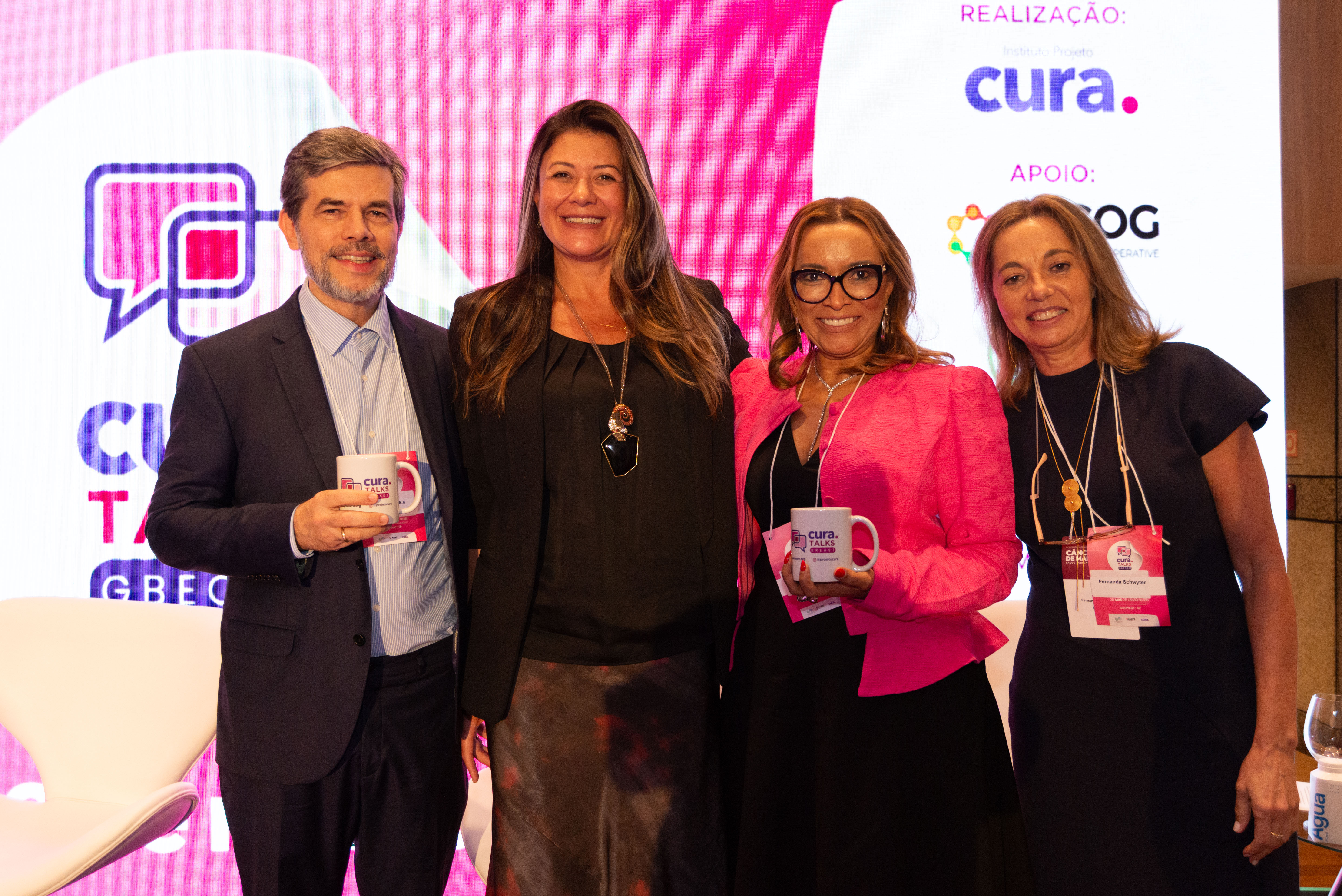
The challenges faced by patients after cancer treatment were the subject of the panels “Life After Cancer”, who addressed aspects such as sexuality, physical activity and return to work. For the first issue, the event was attended by Oncologists Dr. Andreza Souto, Dr. Thaiana Aragão and patient Ana Cristina Reis, moderated by Dr. Maria Cristina Figueroa, and the second part of the module was attended by Dr. Gabriela Prior, Ângela Castro and Influencer and Patient Gi Charaba, moderated by Catia Duarte, bringing medical and personal perspectives on these essential topics for rehabilitation.
To start the first module, Dr. Maria Cristina left an important message: “Thank you for the opportunity to be here, with whom you move everything we do every day, because you are the patients. It is an invitation for us to join forces so that you are more and more understood about the subject, so that every fight that we face, we are together. They are people who need to know their rights and duties every day.”
According to the Moderator of the Return to Work Module, Catia Duarte: “Professional life is very important, and cancer cannot define how far each patient's career can go” and it is on this subject, in how companies are preparing or are prepared to receive this patient that the CEO of Araetá Strategy tells us that “We are unable to identify any company (consulted) that today has a program aimed at this topic. It's not on the agenda, or it has a series of actions in October, but it's not a care”.

The closing included a interactive debate About relationship between doctors, patients and support network, bringing together the experts Dr. Ana Coradazzi, Dr. Roberto Hegg, the patient Eny Estevam Rodrigues and support network representative, Catia Duarte, with the mediation of Fernanda Schwyter. The panel provided an enriching exchange about the role of each individual in confronting breast cancer and in building a more humanized treatment. According to Dr. Ana Coradazzi, within oncology, doctors have the opportunity to build this relationship with the patient:
“What struck me were the times when I couldn't help because I couldn't establish the relationship I would like. And I think that makes the difference in the doctors' relationship with their patients, you don't have to be your patient's best friend, you need to be close enough to understand what they need from you, and the minimum is that you understand their context, their reality, then you look at the data you have at your disposal, you look at the resources that you have at your disposal, which are not always what the literature shows and then you create with it a care strategy that makes sense and is aligned with what he needs. That is the relationship between doctor, patient, family and team, it is a building”.

Acknowledgements
Cura Talks GBECAM 2025 was a success! We thank all the participants, speakers, and mediators who shared knowledge and contributed to strengthening clinical research as an essential tool in the fight against breast cancer.
Special thanks to LACOG and GBECAM for their fundamental partnership in holding this event, and to Daiichi Sankyo, whose support was essential for this journey of innovation and patient care.


If you were unable to follow the event or wish to review the content presented, the full broadcast is available on the Instituto Proyecto Cura YouTube channel: Watch it here.
Photo credit: Casa da Photo

Law No. 14,758/2023, which establishes the National Cancer Prevention and Control Policy (PNPCC) in the Unified Health System (SUS), came into force in June 2024. Its main objective is to reduce the incidence of cancer and ensure full access to treatment for patients.
For the PNPCC to be effectively implemented, urgent regulation was necessary, especially in fundamental aspects such as financial incentives, integration between the Federal Government, states and municipalities, definition of goals, and training of health professionals. After seven months of waiting, the Ministry of Health published three ordinances (Ordinances GM/MS No. 6,590, 6,591, and 6,592) that regulate the policy. These regulations create the Cancer Prevention and Control Network and establish the Navigation Program for People Diagnosed with Cancer in the SUS.
The measures were agreed by the Tripartite Interagency Committee (CIT), in partnership with the Ministry of Health, the National Council of Health Secretaries (Conass) and the National Council of Municipal Health Secretaries (Conasems). Among the most important advances, the following stand out:
• Expansion of telehealth to support remote diagnosis and treatment;
• Agreement between the Federal Government, states and municipalities for shared accountability;
• Strengthening Primary Health Care (PHC) in the regulation of care;
• Incorporation of palliative care at all levels of care;
• Guarantee of cancer diagnosis within legal time limits;
• Training of teams for screening, diagnosis, and effective treatment;
• Reduction of unnecessary travel and greater adherence to treatment.
• Challenges and gaps in regulation
Despite the progress represented by the ordinances, uncertainties still persist about the effectiveness of the implementation of the PNPCC in practice. The regulations address some issues excessively broadly, without detailing concrete mechanisms for their application, in addition to the absence of clear definitions, such as federal funding to reduce regional disparities in access to services, a fundamental aspect to guarantee the viability of the planned actions. Without these clarifications, the implementation of the policy may face operational obstacles and compromise equitable access to cancer treatment in the SUS.
“In addition, a fourth ordinance, still under discussion, will address the purchase of oncological drugs. This text will define the rules for access to medicines and will establish the component of pharmaceutical care in oncology in the SUS.
Given this scenario, there are still doubts as to whether the regulations will be sufficient to guarantee effective cancer care in the SUS. The PNPCC will depend not only on established guidelines, but also on efficient execution, with adequate funding, coordination between federal entities, and continuous monitoring so that advances translate into real benefits for patients.”
Collaboration: Dr. Jéssica Léda - Lawyer

The Cura Project Institute is pleased to announce the Cura Talks GBECAM — Symposium for Patients, which will be held on March 28, 2025, from 8:30 to 18:00 at the Grand Hyatt Hotel, in São Paulo/SP. The event is part of the Multidisciplinary Symposium program, part of the renowned LACOG-GBECAM Breast Cancer Conference.
Dedicated to patients, support networks, representatives of patient organizations, health professionals, journalists and influencers, Cura Talks GBECAM is a unique opportunity to update on clinical studies and research, in addition to sharing the most recent advances in the treatment and care of breast cancer and that have changed in current behavior. The event aims to promote a space for open dialogue and knowledge exchange, in a language accessible to the public, addressing scientific advances with a focus on clinical research and the direct impact on patients.
The symposium will be attended by renowned experts in the field, who will share their experiences and innovations. The interactive format will allow participants to talk directly with the speakers, making the meeting dynamic and enriching.
In-person registrations for Cura Talks GBECAM are free and must be made through the link: https://www.sympla.com.br/evento/cura-talks-gbecam-simposio-para-pacientes/2799877
Check the schedule (*subject to adjustment):
08:30/08:50 - WELCOME COFFEE
08:50/09:00 - OPENING
09:00/09:30 - KNOWING BREAST CANCER: Subtypes and treatments
09:30/10:00 - PAPO CURA
10:00/10:40 - PATIENT JOURNEY AND CLINICAL RESEARCH
10:40/11:00 - PAPO CURA
11:00/11:30 - BREAK
11:30/12:15 - HIGHLIGHTS ASCO & SABCS 2024
12:15/13:00 - PAPO CURA
13:00/14:00 - LUNCH
14:00/14:30 - HOW DO INNOVATIONS REACH OUR PATIENTS?
14:30/15:00 - PAPO CURA
15:00/15:30 - LIFE AFTER CANCER: SEXUALITY + YOUNG PATIENTS AND BREAST CANCER
15:30/16:00 - LIFE AFTER CANCER: RETURN TO WORK, HOW COMPANIES APPROACH THIS PROCESS
16:00/16:30 - PAPO CURA
16:30/17:00 - BREAK
17:00/17:50 - INTERACTIVE DEBATE: Doctor-Patient Relationship — Support Network
17:50/18:00 - CLOSING
The Cura Project Institute is an essential part of the discussions about cancer in Brazil, standing out as a cutting-edge institution in clinical research. Committed to creating opportunities for dialogue and continuous learning, Cura seeks to improve care and raise the quality of life of cancer patients.
GBECAM — Brazilian Breast Cancer Studies Group is a partner of the Cura Project Institute at this event, reinforcing the joint mission of promoting advances in research, education, and awareness about breast cancer.
Take part in Cura Talks GBECAM and contribute to a healthier and more informed future. Reserve your spot and be part of this essential conversation for the fight against breast cancer.
Follow us on Social Networks to have access to all the information about the event:
Instagram - https://www.instagram.com/projetocura/
Facebook - https://www.facebook.com/projetocura.org
LinkedIn - https://www.linkedin.com/company/projetocura

O Talks Breast Care, an event organized by the CURA Project Institute, was highlighted on Drauzio Varella's important medical portal for addressing racial inequality in the context of breast cancer. Gramado (RS) was the scene of an essential debate about the challenges faced by black women in accessing the diagnosis and treatment of the disease, in addition to the need for greater racial representation in clinical oncology research.
Alarming data reinforce the urgency of the topic: although more than half of the Brazilian population is black (black and brown), only 24% of women who undergo mammography exams belong to this group. On the other hand, black women represent 47% of serious cases of breast cancer, according to a study conducted by the Avon Institute in partnership with the Oncology Observatory, based on data from DATASUS between 2015 and 2021.
According to Portal, another study, published in the journal Breast Cancer Research and Treatment, revealed that black women in Brazil are diagnosed at more advanced stages of the disease and have three times higher mortality rates compared to white women. In the United States, breast cancer mortality is 40% higher among black women, showing that racial inequality is a global phenomenon.
During Cura Talks Breast, Dr. Ana Amélia Viana, clinical oncologist and coordinator of the Diversity Committee of the Brazilian Society of Clinical Oncology (SBOC), emphasized that access barriers and lack of representation in clinical research significantly hinder the journey of black women seeking early diagnosis and appropriate treatment. “To change this scenario, it is essential that clinical research be more inclusive and reflect the diversity of the Brazilian population,” he said.
Check out the content on the Drauzio Varella Portal by clicking on the link: https://drauziovarella.uol.com.br/oncologia/cancer-de-mama-mulheres-negras-enfrentam-desigualdades-no-diagnostico-e-tratamento-da-doenca/

Dr. Carlos Barrios, an oncologist, director of the Latin American Oncology Clinical Research Group (LACOG) and researcher at the Oncoclinics Group and São Lucas Hospital of PUC-RS, also participated in the Cura Talks Breast Gramado, making fundamental contributions in the field of clinical research. Dr. Barrios is a mentor and constant presence at the events of the CURA Project Institute, collaborating for significant advances in the area of Oncology and made his contribution on the subject:
The evolution of the human being in social interactions has provided formidable advances in several areas. Innovative technologies, which allow better disease control, development of new drugs and increased food production, have contributed to a significant increase in life expectancy and quality of life. We live longer and better, reflecting collective efforts in science, technology, and global cooperation.
However, it is impossible to ignore that the benefits of these advances are not evenly distributed. Discrepancies in access to and availability of essential resources represent a universal challenge and result in marked inequalities between different countries and, often, even between regions of the same country. Ethnic and racial minorities, and stigmatized social groups are often left on the sidelines, being deprived of full participation in advances that should benefit everyone.
This scenario not only affects minorities, but also large portions of the world's population that live outside of privileged regions, where access to cutting-edge technologies and basic care is still a distant luxury. Thus, inequity, more than a specific problem, has become a structural feature that defines our global society.
Recognizing this reality is the first step in seeking change. However, it is essential to avoid simplifications. Inequalities have multiple dimensions, and to propose definitive diagnoses or unique solutions would be naive. The approach must be individualized and contextualized. Each of us can identify the inequities around us and act locally, seeking to solve small challenges that, together, have the potential to create significant transformations.
In the area of clinical research, particularly in the field of oncology in Brazil, there is a growing effort to include historically underserved populations. The medical community, through initiatives such as the Cura Project and LACOG, works with a clear purpose: to design and conduct studies that address crucial issues for everyone, especially for minorities and marginalized populations. The commitment goes beyond generating knowledge; it is creating transformative solutions that impact lives in a broad and inclusive way.
This task, however, is complex and cannot be performed in isolation. It requires the active collaboration of various segments of society. Building a culture of cooperation, where each individual, institution, and sector contributes according to their capacity, is essential. Only by joining efforts will we be able to move towards a more just and egalitarian world.
The Cura Project and LACOG are concrete examples of this vision. These platforms provide opportunities for the active participation of all stakeholders, promoting inclusion and mobilization around a common goal: reducing health inequalities and ensuring that advances in science truly benefit everyone. Supporting these initiatives is investing in building a more equitable society, driven by the dream, dedication, and leadership of committed volunteers.
Working together, with solidarity and purpose, is the path to achieving a more just and promising future for all humanity.
.jpeg)
Dr. Heloisa Resende, president of the Scientific Committee of the CURA Project Institute, reinforced the organization's commitment to promote clinical research that provides answers relevant to oncology. “The CURA Institute works in three main areas: education and awareness for the lay public about the benefits of research and the rights of participants; debates with opinion leaders to identify obstacles to clinical research; and fundraising for academic projects.”
An example is the Impact of Extreme Social Vulnerability & Breast Cancer Study: a population-based study in Brazil, led by Dr. Max Mano and supported by the CURA Project Institute. This project aims to analyze the impact of social factors on breast cancer treatment outcomes in Brazil, helping doctors to better understand the particularities of their patients and their social contexts.

Racial inequality in breast cancer is a reflection of the historical barriers faced by the black population in Brazil, which include lower access to health, late diagnoses, and less effective treatments. Cura Talks Breast proved to be an essential event to promote discussions about solutions that can change this scenario, in addition to reinforcing the importance of including black women in clinical studies.
By bringing together experts and fostering constructive debates, the CURA Project Institute reaffirms its commitment to reducing inequalities and building a more just and egalitarian future for all women.

Dr. Carlos Barrios, who is a constant presence at the Cura Project Institute events, where he acts as a Mentor on essential topics in the field of clinical research, contributing to significant advances in the area of Oncology, was recognized in the 2024 edition of the annual Highly Cited Researchers survey, published by the academic consultancy Clarivate Analytics.
Acting as an Oncologist, Director of the Latin American Oncology Clinical Research Group (LACOG) and Researcher of the Oncoclinics Group and São Lucas Hospital of PUC-RS, Dr. Carlos Barrios receives credit for this prestigious ranking that highlights international scholars considered to be among the most influential in the world.
The Cura Project Institute believes that clinical research is fundamental to transform science into concrete solutions that directly impact people's lives. Guided by a mission aimed at fostering clinical research and commitment to society, Cura works to promote significant advances in the area of health, especially in the field of oncology.
This commitment is reflected in the partnership with renowned professionals, such as Dr. Carlos Barrios, and recognition such as the survey Highly Cited Researchers 2024, is proof that dedication and scientific rigor generate impacts that transcend geographical barriers, benefiting patients and health professionals on a global scale.
The Institute sees clinical research as a tool for developing new treatments and also as a means of giving voice to civil society. Through advocacy initiatives, Cura seeks to expand access to information, strengthen the relationship between researchers, patients, and governments, and encourage public policies that prioritize science and health.
The phrase “Research saves lives” encapsulates the essence of the work of the Cura Project Institute. For this reason, Cura will continue to invest in initiatives that promote research, bringing together health professionals, scientific communities and society in general.
The Cura Project Institute, with great pride and admiration, congratulates Dr. Carlos Barrios for this recognition and reinforces the importance of clinical research for the development of new treatments and the increase of patients' quality of life.
.jpeg)
.jpeg)
.jpeg)
.jpeg)
See the list of Researchers: https://clarivate.com/highly-cited-researchers/

Meeting promoted discussions about the role of the public and private sectors in the advancement of clinical research and is now available on YouTube
On November 8, the Cura Project Institute held the 5th edition of Cura Meetings, which took place during the 25th Brazilian Congress of Clinical Oncology (SBOC), in Rio de Janeiro. The event brought together doctors, health professionals, representatives of the pharmaceutical industry and the government to discuss the topic “Financing clinical research: a coalition of medical and civil society, government and pharmaceutical industry for clinical research.”
The session was a milestone to discuss the need for joint investment and addressed how the joining of efforts between public and private sectors can promote the development of new treatments for cancer. The invited speakers — Renato Porto (Interfarma), Pedro Ivo Sebba Ramalho (Ministry of Health) and Igor Bueno (FINEP) — brought important perspectives on the role of investments in the oncology sector.
According to Dr. Pedro Ivo, speaking on behalf of the Ministry of Health:
“We have some great opportunities to improve this environment and to make us increasingly capable of carrying out projects of this nature, speaking specifically of oncology research, and one of those opportunities is for us to better qualify institutions and at the same time publicize the program and the forms of access to the program, which also includes the collection of donations for the projects.”
We quote the position of Dr. Carlos Barrios who spoke out:
“I think that the country lacks, from a political point of view, strategies that are not only stable, continuous, that have a future and that people know that there will be a call in the month of November, there will be a call in the month of January and that people can prepare themselves, because the instability of the process and the complexity and the lack of disclosure, eventually compromise the access process and the objective that the government has.”
Also according to Dr. Barrios:
“It's a matter of maturation, the process of support that may come from the government I would think more about structuring within the government that was more uniform, clearer to understand, more predictable and obviously continuous and, recognizing the difficulties and the minimum participation that Brazil has in international clinical research, if the government would not have at least part of those resources to allocate funds to support research structures.”
During the debate, Dr. Igor Bueno made his statement:
“If we succeed now, with this predictability, this continuity, we are able to know what is necessary, strategic and what is the focus, I think it is fundamental, and forums like this are fundamental for us to be able to understand the public and the plaintiff. The public sector with its initiatives, FINEP with its public call, operating the fund and, what is the need of the industry, what is the need of the researcher. By talking, we are able to meet what FINEP will support and the demand of the institutions, this is the challenge since we have this predictability and continuity of a stable resource to support research.”
Also during the debate at the 5th Cura Meetings, Dr. Fábio Franke states that:
“The rules (about research) are not yet clear, which is why regulation is urgent, so that we can have clearer rules and attract more research, train more researchers and have proposals. And that is the purpose of Cura, proposals that answer our local questions, studies that demonstrate the reality of our population, that have an enormous and extremely interesting ethnic diversity, that we can make protocols that are more inclusive, that we can use this data and that knowledge for the advancement of the SUS, which will then be able to better define public policy strategies. So, everything is interconnected, but if we don't reduce the bureaucracy of the system and create clear rules, we will always continue to face the same difficulties.”
In his participation during the debate, Dr. Renato Porto said that:
“Regarding regulations, Brazil had no legal framework for clinical research, and now we do. We have difficulty regulating, in fact there are some situations, and speaking in a very synthetic way, we still have a cultural perception of what clinical research and scientific testing are very poor in the country and maybe that's a bit of the fact that we haven't done research over the past few years, so we need to start at some point and start quickly.”
The Cura Project Institute thanks the moderator Dr. Heloisa Magda Resende, President of the institution's Scientific Committee, and the debaters Dr. Carlos Barrios and Dr. Fabio Franke, who enriched the discussions with their experiences. Fernanda Schwyter, president of the Cura Project Institute, highlighted the relevance of this event as an essential space for exchange and collaboration.
The 5th Cura Meetings reinforced the commitment to expand access to science and innovation in Brazil, promoting opportunities for new research to become feasible. The full content of the event is now available on YouTube for those who wish to delve into the discussions and reflect on the future of oncology in the country.
.jpeg)
.jpeg)
.jpeg)
.jpeg)
Do you want to watch the full debates? Access the full event on YouTube
Link: https://www.youtube.com/watch?v=GmnKpwDIVZQ
Instituto Proyecto Cura is present at the 25th SBOC Congress with emphasis on advocacy in oncology
On November 7th, Fernanda Schwyter, president of the Cura Project Institute, participated as a speaker at the 25th Congress of the Brazilian Society of Clinical Oncology (SBOC), in the session “The relevance of advocacy actions in oncology: access & clinical research”. During her presentation, Fernanda highlighted the importance of non-governmental organizations (NGOs) in raising society's awareness of the benefits of clinical research and its impact on access to innovative treatments.
The event also included a moment of celebration, during which Fernanda met with members of the Scientific Committee of the Cura Project Institute, reinforcing partnerships and the exchange of knowledge between specialists in the field.
The Cura Project Institute thanks SBOC for the invitation and the opportunity to contribute to such relevant discussions, reaffirming its commitment to innovation, research, and access to health for all.
.jpeg)
.jpeg)
.jpeg)
.jpeg)
About the Cura Project Institute
The Cura Project Institute is a non-profit organization dedicated to raising awareness and funding clinical research in Brazil, working for 10 years to expand access to innovative treatments and combat cancer. More information is available on the Institute's website and on social networks: Instagram, Facebook, YouTube and LinkedIn.

Event brings together leaders from medicine, government, civil society and the pharmaceutical industry to discuss a coalition for clinical research in the fight against cancer
The Cura Project Institute will hold the 5th edition of Cura Meetings, an event integrated with the 25th Congress of the Brazilian Society of Clinical Oncology (SBOC), to discuss the topic “Financing clinical research: a coalition of medical and civil society, government and the pharmaceutical industry in favor of clinical research.” The meeting will take place on November 8, 2024, from 14:30 to 16:15pm, in room IBIZA II at Windsor Oceânico, and will bring together important names in health, research, government and the pharmaceutical industry to discuss the relevance of the union between sectors to strengthen the funding of oncological research in Brazil.
The event will be an exclusive space for professionals enrolled in the SBOC Congress and will address the challenges and opportunities of leveraging funding for clinical studies, with the objective of making Brazil a center for innovation and development in oncology. In the program, experts will discuss how collaboration between civil society, the private sector and the government can boost clinical research in the country and ensure that innovative treatments are available to more Brazilians.

Schedule — 5th Cura Meetings | Cura Project Institute
Schedule:
About the Cura Project Institute
The Cura Project Institute is a non-profit organization that promotes awareness and fundraising for independent clinical and academic studies in the area of oncology, aimed at combating cancer in Brazil. For 10 years, the Institute has been leading research support and encouraging the engagement of health professionals and civil society in funding studies, seeking to expand access to innovative treatments for Brazilian patients. More information is available on the Institute's website and on social networks: Instagram, Facebook, YouTube and LinkedIn
Service:

“Care Begins with Information”, will be the focus of the Pink October 2024 Campaign of the Cura Project Institute
The Cura Project Institute once again joins the Pink October Campaign, reinforcing the importance of raising awareness and preventing breast cancer. In 2024, the central theme of our campaign will be “Care begins with information”, a call to reflection on how knowledge can save lives.
Each year, thousands of women face the challenge of breast cancer. However, with access to the right information, the path from diagnosis to treatment can be clearer and less lonely. The purpose of our campaign is to disseminate quality knowledge, empower women and their support networks, and highlight the fundamental role of health professionals in this process.

Cura Talks Breast - an information event
One of the pillars of this year's campaign will be Cura Talks Breast, an event that brought together renowned experts, patients, and activists to discuss advances, challenges, and experiences in the fight against breast cancer. The event, which took place on August 29 during the 18th Gramado Breast Cancer Congress, went beyond the sharing of technical data — it was a space for dialogues that promote hope and action.
Speakers and debaters had varied topics, from new diagnostic methods and treatments to exchanges of experiences and stories from influencers and journalists.
According to the President of the Cura Project Institute, Fernanda Schwyter:
“Our goal is to use the Cura Talks Breast event and its highly relevant topics in this year's Pink October campaign, showing that, in addition to science and medicine, self-care begins with access to information.”
The Power of Information in Women's Health Care
Throughout the month of October, the Cura Project Institute will share educational content about breast cancer, covered in Cura Talks Breast, including:
In addition to providing access to essential information, we want to create a support network that amplifies the awareness message. We encourage the public to interact, share their stories, and learn from the experts.
The Cura Project Institute invites society to follow our actions during Pink October. Care begins with information, and together we can create a more aware, stronger, and supportive community. Information is the starting point for a future where breast cancer is detected and treated early, allowing more lives to be saved.
In this Pink October, let's reaffirm: care begins with information.

Last August 29th, Gramado in Rio Grande do Sul hosted Cura Talks Breast, an event conceived by the Cura Project Institute, held in parallel with the 18th Gramado Breast Cancer Congress and which brought together more than 50 guests and participants, including representatives of patient organizations, health professionals, journalists and influencers. With nearly 10 hours of intense programming, the event was a success, providing valuable insights into the importance of clinical research and advances in breast cancer treatment and care.
The day began with Catia Duarte, Counselor of the Cura Project Institute, who presented general information and guidelines for the participants. Then, Fernanda Schwyter, President of the organization, kicked off the activities with an inspiring opening, preparing the ground for the discussions that followed.

Between the moments of the panels, oncologist Dr. Pablo Barrios brought an in-depth view of the complexity of breast cancer in his lecture “Breast Cancer: Who Are You?”. Soon after, mastologist Felipe Zerwes highlighted the importance of early diagnosis in the evolution of treatment, presenting an overview of the current scenario and the challenges faced.
One of the highlights of the event was the debate that brought together representatives of important organizations such as Camaleão, Femama, Américas Amigas and AMUCC. For one hour, the participants discussed advances and challenges in the field of breast oncology, enriching the event with different perspectives.

After a brief break, Dr. Heloisa Resende discussed the relevance of clinical research and the importance of regulation, followed by a debate moderated by Fernanda Schwyter. The highlight of the morning was the roundtable with influencers such as Claudia Bartelle, Jussara Del Moral, Carol Magalhães and Gi Charaba. They shared their experiences and discussed the impact of onco-influencers in the dissemination of information about breast cancer, generating profound reflections among those present.


In the afternoon, interactive sessions brought up questions about inequalities in access to breast cancer treatment and the importance of the topic on the political agenda and in the interest of civil society. The lectures given by Dr. Ana Amelia Viana, Dr. Fernanda Bairros, Mônica Leal, and Cíntia Seben were especially impactful, providing rich and enlightening discussions.
Another important moment was the discussion about the journey of metastatic patients, conducted by renowned oncologists Dr. Carlos Barrios and Dr. Gustavo Werutsky. They addressed the issue of patients' longevity and quality of life, bringing a new perspective on survival to metastatic breast cancer.
.jpeg)
In her session, Dr. Alessandra Morelle addressed the impact of new technologies and artificial intelligence on the treatment of breast cancer, pointing to the future of oncology.

The event ended with a special session, where journalists Cristina Ranzolin, Alice Bastos Neves and Duda Streb shared their perspectives on the dissemination of information about breast cancer in the media, providing an inspiring and informative closing.

Cura Talks Breast 2024 has established itself as an essential space for the exchange of knowledge and experiences, reaffirming the commitment to the advancement of breast cancer research and treatment in Brazil. The recording of the event will be available on the Cura Project Institute's social networks, allowing the discussions to continue to reverberate and reach an even larger audience.
Watch Cura Talks Breast Gramado.

O Cura Talks Breast Gramado it was undoubtedly a milestone in the promotion of research and knowledge in oncology, reinforcing the importance of joining efforts to ensure continuous advances in the fight against breast cancer.
With the mission of promoting clinical research in favor of oncology, the Cura Project Institute, with Cura Talks Breast Gramado, reaffirms its commitment that healing begins with research, and that research saves lives.

In the photo: Fernanda Schwyter, President of the Cura Project Institute; Dr. Felipe Zerwes, Dr. Carlos Barrios and Dr. Antônio Frasson, creators of the Gramado Breast Cancer Congress; and Cátia Duarte, Counselor of the Cura Project Institute.
Cura Talks Breast was sponsored by: Daiichi Sankyo, Lilly, MSD, and Novartis.
